
The Project Gutenberg eBook of The Black Cat (Vol. I, No. 1, October 1895), by Various
Title: The Black Cat (Vol. I, No. 1, October 1895)
Author: Various
Release Date: February 16, 2022 [eBook #67422]
Language: English
Produced by: hekula03, Brian Wilsden and the Online Distributed Proofreading Team at https://www.pgdp.net (This book was produced from images made available by the HathiTrust Digital Library.)

THE SHORTSTORY PUBLISHING CO. 144 HIGH ST., BOSTON, MASS.
Copyright 1895 by The Shortstory Publishing Co.
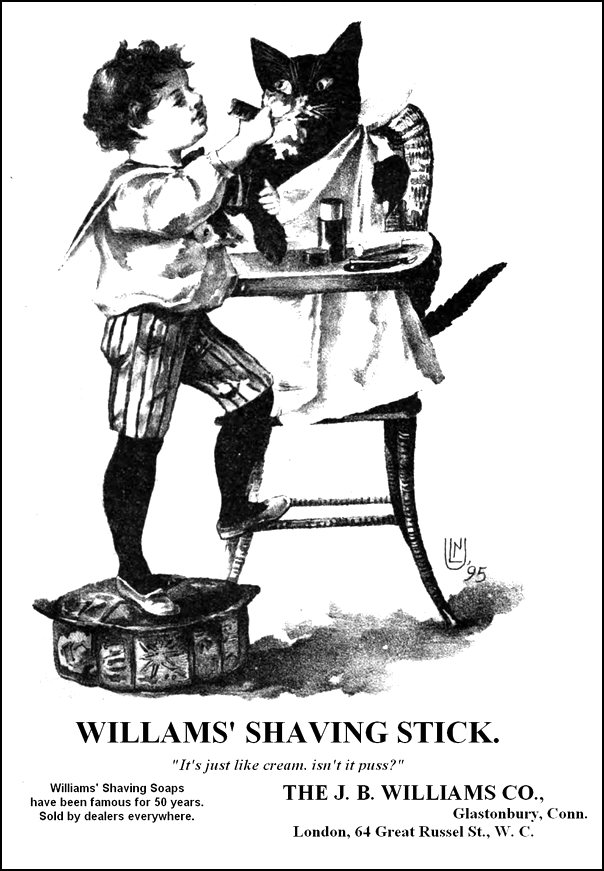
October 1895
A Monthly Magazine of Original Short Stories.
No. 1.OCTOBER, 1895.
5 cents a copy.
50 cents a year.
Entered at the Post-Office at Boston, Mass., as second-class matter.
| Title | Author | Page |
| In Gold Time. | Roberta Littlehale. | 1 |
| The Unturned Trump. | Barnes MacGreggor. | 6 |
| The Secret of the White Castle. | Julia Magruder. | 11 |
| Miss Wood,—Stenographer. | Granville Sharpe. | 17 |
| Her Hoodoo. | Harold Kinsabby. | 29 |
| In a Tiger Trap. | Charles Edward Barns. | 36 |
| The Red-Hot Dollar. | H. D. Umbstaetter. | 42 |
| Advertisements. | 50 |
BY ROBERTA LITTLEHALE.

HE was straight, and grizzled, and keen of eye. He had worked, and fought, and gambled his way through the lawlessness and passion of the State's early life into the decency and uprightness of a successful contractor.
His name was Bill Bowen.
As a civil engineer, I came more or less in contact with him, and rejoiced in the largeness of his mental mold, as well as in the business sense of security he let me enjoy.
One summer's night we took a drive to a distant town on the San Joaquin River. We were to look at stone for bridge building, and the blistering heat of the day made us willing to lose our sleep for the more comfortable traveling by starlight.
The horses jogged lazily through the coarse, thick dust on the river's levee, and the insects from the grain fields and the frogs from the sloughs had things wholly to themselves until Bill suddenly interrupted.
"Mrs. Chase is pretty enough yet to understand why she sent two fellows to the devil, isn't she?"
"What are you talking about?" I answered.
"Oh," said Bill, pulling himself up, "I forgot you didn't struggle with the rest of us through those groggy days." [Pg 2]
I knew Bill well enough to let him relapse just so many minutes; then I said: "Judge Chase's wife is lovelier at sixty than most girls at sixteen, but I hadn't an idea she figured so romantically in the early days as to send anybody overboard."
"H'm," replied Bill reflectively.
The horses traveled on without attention, and I waited in patience.
"You know what it was like," he began at last. "Men with guns from all over the Union and gold the heaven we sweated for. Prayers, and court, and the gambling tables all running under one roof, and nary a woman's face showing up in the mass to give us courage. To be sure, there were vixenish ribs o' Satan who robbed, and killed, and drank with the worst of us; but until '51 we'd never the woman for reverence. Then, by degrees, the lawyers and a stray merchant or two aired their families, but things wasn't dizzy till pretty Grace Blanchard got out with her father.
"Understand, she carried herself as she'd ought to; but, understand, there was men among us as was born and bred to live with blood. The mass of us had to take out our satisfaction in looking at her; but for two the favor in old Blanchard's eyes was easy reading, and it wasn't long seeing the course the straw took.
"Ned Emory was a long, lean, blond fellow, with a blamed fine face and a way that made friends of the toughest. They said he looked a swell when he called at the Blanchards', but I never saw him but like the rest of us,—red-shirted and overalled, and an angle to his pistols that made him a joy.
"George Stokes—'Shorty,' we called him—was a man with an answer that ripped like a knife and a head that made success of everything, because it could work crooked as well as straight. He'd been on the bench, but he'd located a vein at Mariposa, and was overseeing up there in '52. Naturally, he lost opportunities, not being right on the spot, and the danger began.
"The Blanchard house was swelled larger than most of the cabins, and had two long windows that opened onto a porch. Things might never have been so bad but for those two lidless eyes in front.
"One fatal night Shorty Stokes rode into the settlement,—but I'm getting ahead of affairs."
[Pg 3]
Bill tossed his cigar into the tules, and hurried the horses into effort as the interest of his reminiscence swept him on.
"The girl carried herself after the fashion of high steppers, and neither fellow could swear where he stood. It was laughter and spirit for both of them, they said, and nip and tuck for the yielding. The pace was the sort that exhausts men, and Shorty's brain for lawyering cooked up a scheme for his rescue. He was for their going together some night before her, and, after a formal marriage proposal, each argue his claim and fitness for ten minutes by the clock, their honor at stake to stand by her decision.
"It got about afterwards that Emory wouldn't consent till he saw the devil to pay in Shorty's earnestness, and they swore with their fists in each other's to carry the thing through to the finish. The date and hour were arranged for the following Sunday night at eight, and they drank to it with gall in the cup.
"When the evening came the clock had already struck eight when Stokes reached the Blanchard house.
"The lights from the room fell over the porch, and from the shadow of the steps he saw the something that in all the world he couldn't bear to see,—Emory crossing the room to take Grace Blanchard in his arms; Emory with passion paling his face and Grace Blanchard in the beauty of a disturbing humility.
"He cursed as he watched them cling to each other, and he cursed his way back to the saloons and his Mariposa mining.
"The next day he turned up again in the settlement, with liquor enough aboard to put a wheel in his head, and, after a losing fling at the tables, he started to find Emory.
"After a little ineffectual riding, he leaped from the back of his vicious-eyed piebald at the corner that bulged thickest with saloons, and stood close to the stirrup with his hand on his hip. Some one who noticed him said his face had the steely intensity of a razor edge.
"Then out of the crowd, unconscious, with the music of love in his heart, swung Ned Emory. His hat was pushed back on his fair hair, and he was whistling the overflow out of his veins.
"In one instant a bullet rang through the air, followed by another. Emory fell in his own blood, and a horseman was riding off wildly and safe through the shower of bullets that rained [Pg 4] around him. Every man with a cayuse tore in pursuit, but they only brought back eight half-dead horses. Stokes had staked relay beasts at different points along the road, and was then safe in the chaparral cañons toward the north.
"The gambling dens choked up with the crowds; gold-dust was heaped on gold-dust for the reward of the cowardly hound. Murders weren't rare then, but there was only one Ned Emory, remember.
"Four of us wouldn't drop the search. We let the blood-money men get out of the way, and then we worked as we'd toil for only our own.
"There was scarcely no scent to follow, for Stokes had bribed the greasers who furnished his horses; but we forced our way along on nothing. Day and night we rode with our eyes open, sometimes bullying and sometimes begging. It began to seem hopeless. The days were running into summer again.
"One afternoon, toward twilight, we rested on the crest of a mountain where the path took a sudden turn away from a two-hundred-foot precipice.
"We were torn with the snapping branches of the greasewood, and full of extremest dirt and disgust. Suddenly we heard the rustle of a step on the fallen leaves. Under a live oak, not thirty yards away, on the very edge of the cliff, stood Shorty Stokes. He had not heard us, and he stood looking at the moon which hung a sickle in the hot sky. The evening star was showing.
"The four of us were like stones. He could have got to Guinea before motion'd have come to us. Then, simultaneously with our steps forward, he turned and looked into our faces.
"It was a moment to test the nerve of any man. He stood it as we were used to seeing him face all things.
" 'I suppose I'm the man you're after,' he said.
"He said it with the dignity of a parson.
"In a second he had thrown down his pistols. He unsheathed his knives and dropped them to the ground.
" 'Take me,' he said.
"Four of us looked into the unflinching clearness of his eyes. As we hesitated, he spoke again.
" 'Listen. It is not in excuse that I speak, nor in weakening.
[Pg 5]
It is to tell you that those among you who are men will follow my steps under like circumstances.
" 'Emory gave me his hand and his oath, in the manner of his frankness, to stand by an arranged agreement.
" 'We were to meet at eight o'clock on that Sunday night. A—a beautifully good woman was to decide on our argument which man she would marry. In riding to meet my engagement I happened on an accident. Within half a mile of the settlement, close onto time, my piebald went back on his haunches and the groan of a man came up from the roadside. I found an overloaded miner, hurt in the leg, and the hope in my own heart aroused my sympathy. I mounted the man on my beast and headed him back toward camp.
" 'Walk as I never walked, I reached the meeting place three minutes late. Ah—God—out in the darkness I saw Emory taking advantage of the delay.
" 'None of you is so much a cur as to let the life run in a man who, under his honor, couldn't yield a rival three minutes' grace.
" 'But, with the camp against me and Emory the friend of the sorriest, I couldn't face the music when the justice was done.
" 'It is not mercy I ask. It is life hereafter. Come.'
"With a common impulse we started forward, only to halt in a frozen horror as Stokes' bronco threw up his head in alarm to watch with us the backward somersaulting of his master's body over the precipice.
"Though there was but one verdict, even Chase said as we rode down over the mountain that night, 'Emory might have given Shorty a few minutes' grace.' "
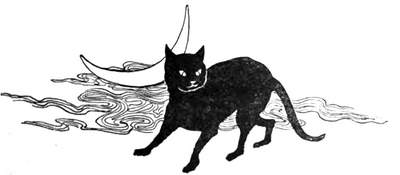
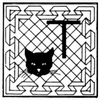
THE ferry-boat, "Rappahannock," had an experience in the winter of 1873 that will never be forgotten by any of her passengers.
During one of her regular trips between New York and Brooklyn this boat suddenly quitted her respectable, though somewhat monotonous, career, and became a common tramp, without port or destination.
The day awoke in fog such as the oldest inhabitant had never seen. The East River was blocked with ice and soon became a shrieking bedlam of groping and bewildering craft, whose pilots could scarcely see their hands before their faces.
At half past nine the "Rappahannock" left Brooklyn, well laden with passengers, and started on her customary trip almost directly across the river—a very short and unusually easy voyage. Before even reaching the middle of the stream, however, the ice and fog had thrown her completely out of her course. Back and forth, up and down stream, the pilot vainly groped, amid the shrieking whistles, ringing of fog bells, and loud crash of ice boulders, until, in the confused clangor, he had entirely lost his bearings.
When, after long and perilous battling with ice jams and many hair-breadth escapes from collisions, he suddenly sighted the landing place on the New York side, he found it occupied by a sister boat, which had been driven there to avoid destruction. He backed out, only to be lost again, and for three hours this boat, now become a mere tramp, wandered aimlessly up and down the East River with its load of excited passengers, whose emotions ranged anywhere between the rage and impatience of the belated Wall Street speculator, to whom the delay might mean a loss of fifty thousand dollars, to the hysteria of a nervous little woman [Pg 7] who had left her baby alone at home, and who begged the other helpless passengers for the love of heaven to help her set her feet once more on land.
Between these two extremes of impatience and excitement was a small proportion of passengers who remained calm, even endeavoring to while away the time by exchanging pleasantries and making wagers as to the time of their deliverance. Among these was a group of men in the cabin who, after having read and re-read the morning papers, were casting about for some other method of killing time. One suggested a game of cards.
"Cards!" laughed one of his companions in misery. "Who'd carry cards on a ferry-boat? Who, outside of a lunatic asylum, would start on a ten minutes' voyage provided with games to pass away the time?"
"Here is a euchre deck which is at your service."
The speaker, evidently a globe-trotter, drew from under the bench a traveling-bag, so much worn and embellished by tags, labels, and hieroglyphics that it resembled some old veteran just returned from the wars and still covered with surgeons' plasters. From this he produced a pack of cards and tendered it to the man who had suggested a game.
"Certainly, if you will join us; but what shall we do for a table?"
"Here is a camp-stool," said the man of the world. And in a moment four men were sitting around it, cutting for deal, which chanced to fall to the stranger.
The cards were distributed rapidly, and the dealer was about to turn the trump when a loud shriek pierced the air and a woman opposite suddenly sank fainting to the floor.
The tension among the passengers had become so great that a panic seemed imminent.
"Don't be alarmed, gentlemen; it is nothing serious," said the dealer calmly. "The lady simply caught sight of her own frightened face in the mirror, and the shock caused her to faint. It reminds me of a thrilling experience an American traveler had while bumping through Syria. But, pardon me, the game!"
Once more he made a movement to turn the trump, when one of the party exclaimed:—
[Pg 8]
"There can't be a better time or place than this for telling a thrilling experience."
"Yes," said another; "do give us some other kind of bumping than we are having here. Let's have the story before we begin the game."
The stranger leaned back, passed his cigar case, and, having lighted a weed himself, began:—
"It is an unwritten law among the wild Bedouins east of the Red Sea that if an infidel traveler is attended on his journey by one of the faithful he is safe from the attacks of Mohammedan robbers. As long as the 'Frank,' as all foreigners are called, is under the protection of the Star and Crescent, the rascal's hand is stayed, and as they meet, the villain, who would otherwise show no quarter, salutes with the grave suavity of a courtier. But let that same traveler become separated from the Arab guard that he has bribed to give him safe conduct through his own bandit-infested country, and he becomes legitimate prey. He will be plundered and perhaps killed, or, worse, if the robber thinks that cruelty will extort any secrets of hidden spoil, tortured or held for ransom, with each day's delay losing a few fingers, which are forwarded to the captive's friends to signify that the rascals mean business.
"The party in which this American was traveling had been entering Syria from the south, and were progressed some twelve days from the sacred base of old Sinai. At a place called Bir-es-Sheba, on the regular caravan route to and from Mecca from the north, they heard of some interesting archeological treasures just unearthed some two days' journey to the east, and, having made the detour, the party snugly encamped by the side of a beautiful stream under the shadow of the Tubal chain of mountains.
"The treasures were vastly exaggerated, as is the custom with everything oriental, and they soon determined to turn back to the caravan route and 'bump' on up into Syria—'bumping' being the familiar term for camel riding, and a very expressive word at that. But on the afternoon of the first resting-day some one suggested a jaunt to a famous old well, where it was said were some very ancient tumuli. But, knowing the Bedouins to be conscientious liars, and sick of this unrewarded chase for phantom treasures, [Pg 9] the American begged to be left behind in charge of two tents, which were pitched side by side on the bank of the stream.
"This was at last agreed upon, the whole party except himself going off on their three days' trip, leaving their comrade stretched at full length on a rug, his narghili, or water pipe, lighted for company.
"This oriental atmosphere, gentlemen, is a powerful drug. Do what you will to fight against it, its subtle charm holds you captive. The man succumbed to its influences and went fast asleep.
"Out of this sweet, trance-like repose he suddenly bounded into the horrible consciousness of a torturing pain in one of his hands, as though some wild beast was crunching the bones. But, as he writhed to his knees to grapple with the foe, he saw instead three swarthy, evil-faced Bedouins bending over him with ghoulish glee. One had just cut off, with a hideous dirk-knife, the first three fingers of his left hand. In an instant it flashed upon him that these were to be sent to his friends with a demand for ransom. He was correct in this supposition, for no sooner had the bleeding hand been rudely bandaged than two of his captors set out upon this mission, leaving him in care of the third, who was heavily armed.
"No one knew better than the prisoner how impossible such a ransom would be. His fellow-travelers had brought as little money into Syria as would meet their actual necessities while there. He therefore began to cast desperately about in his mind for a loophole of escape before the fellows should return with these unsatisfactory tidings, which would result, no doubt, in further mutilations.
"As his gaze swept the tent for something suggesting a plan for deliverance, he saw it had been gutted of everything except two articles,—his light silk coat, which hung upon the partition between the two tents, and the tourist's shaving mirror which it concealed. The coat had been overlooked because it was as grimy as the tent wall itself.
"In moments like this one grasps at straws. As it is said a drowning person reviews his past experiences perfectly in a brief moment, so to this man, facing desperate odds, came a desperate suggestion.
[Pg 10]
"He called loudly on a supposed protector in the adjoining tent to come to the 'window,' and prove to his captor that he was under protection of a Moslem. As he spoke he slowly drew the coat from before the mirror in front of which the sheik was standing.
"No words can express the unutterable consternation pictured upon that blazing face, livid with fright and wonder, as for the first time it saw its own awful reflection, not knowing it was its own. One instant he stood stock-still, fascinated, horrified, overwhelmed; then collapsed, just as that lady did but a moment ago, and the American quickly possessed himself of his captor's arms and was master of the situation.
"And now, gentlemen," concluded the story teller, "we will have our game."
As he spoke he again reached forward to turn the trump. There was a quickly drawn breath of horror from those who observed him, for the first three fingers of his left hand were missing.
Before he could turn the card, a savage lurch of the boat, accompanied by the creaking of timbers, announced the arrival of the Rappahannock at her New York slip—and the trump was never turned.
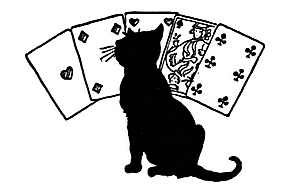
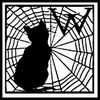
WHEN I became the occupant of the Chateau Blanc, in the neighborhood of Fontainebleau, I found that my wish for a place of complete seclusion was likely to be realized to the full. I was not in a state of mind for society, and I had deliberately given myself three months in which to fight out a certain battle with myself, for which I needed solitude and reflection.
When the old woman who acted as keeper and caretaker of the place took me through it, on a tour of inspection, there were three things which, in spite of my preoccupation with my own affairs, struck me very forcibly. The first was the forlorn remnants of the body of a white swan, which must once have been a creature of splendid size and shape. My informant told me that this swan had been a great pet of the former owner of the chateau, until some accident had killed it; after which it had been stuffed and fastened in its place upon the surface of the little lake under his window. There it was still—what remained of it—a mass of weather-beaten and dirty feathers.
Another thing that compelled my strong attention was a certain picture which hung in the bedroom of the late owner, and which I was informed was his own portrait, painted by himself. This room, by the way, was sinister and mysterious in its effect beyond any I had ever entered. One reason for this was the fact that all the furniture, which was elaborately carved and which must once have been of beautiful polish and color, had been ruthlessly covered with a coat of black paint,—the bed, the table, chairs, wardrobe, chests of drawers, and even the great leather easy-chair which was placed just under the picture, facing the opposite wall.
It was a wretched piece of work, that picture, representing a [Pg 12] man dressed in some sort of court dress of the last century, and it would have seemed ineffectual and amateurish to the last degree but for the truly marvelous expression of the eyes, which were fixed on a certain spot in the wall opposite with an earnestness and intensity which made me feel that there was some hidden significance in this look. The man not only looked at the spot himself, but he compelled me to do the same, and forced me, by the insistent command of his eyes, to look again and again.
And yet there was nothing to see. The wall was perfectly bare in that place and covered with a meaningless sort of wallpaper, which gave me no encouragement whatever.
Another thing that I noticed specially, with a feeling of being imperiously directed to do so, was a large rusty key that hung on the wall directly under the picture. When I inquired of the old woman what this key belonged to she answered that she had never known, but that it had been hung there by the late proprietor and had been undisturbed since his death. That event had occurred a great many years ago, and it was owing to the provisions of the will left by him that no one had ever occupied the house in the interval. The prescribed time had only just expired, and I was the first person to rent the chateau, the revenue from which was to go to a nephew, who lived abroad.
The somberness of the black chamber suited my frame of mind, and I decided on taking it for my room. Besides this, the picture, the key, and the white swan all interested me, and, as it was the first time that an outside interest had made any headway against the melancholy of my own thoughts, these objects, far from cheerful as they were in themselves, afforded a grateful diversion.
So continually did I wonder why the picture looked always and could compel me to look at that one spot, and why the key had been hung in that place and had kept its position so many years undisturbed, as if some ghostly guardian watched over it, and why, ever and always, the old white swan compelled me, as if by some irresistible power, to connect it with these other things, that I kept myself awake at night, weaving all sorts of stories concerning these objects, and spent half my days in looking from the picture to the wall, and back again to the key, and then out [Pg 13] of the window at the battered effigy of a noble bird beneath it, until the confusion of mind thus produced seemed likely to drive me crazy.
I expended all the ingenuity of which I was master in questioning the old woman, who had lived here in the time of the former owner, but the satisfaction of my curiosity in that direction was rather meager.
She told me that her former master had had a wife whom he adored, fair as an angel, and gifted with a divinely beautiful voice, such as none had ever heard, before or since. This young wife had been snatched from him by a sudden and frightful death. The fever which seized her had been so contagious, the woman said, that every one had fled the premises, except one woman servant and the master himself. These, with the help of the doctor, had nursed the young wife through her brief illness until its end.
My informant had heard it said that the circumstances of her death were very peculiar,—that, in her delirium, on the very last night of her illness, those who had ventured to linger about the premises had heard her singing more gloriously than ever in her life; that it had reminded them of the great white swan, which but the night before had sung its last sweet song on the lake, in the moonlight, and had been found dead in the morning.
The woman who had remained to help the master in his last sad ministrations to his dying and dead wife had gone away the day after the funeral, and had never been heard of since.
That funeral, in the quaint old church but a few paces from the house, had been, from the woman's account, a melancholy affair enough. Scarcely any one dared to come to it, so malignant had been this fever, and it was feared that the few men who were willing to act as pall-bearers would not be equal to the task; but the poor lady had always been slight and fairy-like in figure, and so wasted was she from this consuming fever that the bearers declared that her weight was scarcely more than that of an empty coffin. The woman further said that, as the small funeral cortege was leaving the church, it had surprised every one to see the husband, who was directly behind the coffin, pause abruptly under a statue of the Virgin, and single out, from the [Pg 14] great bunch of white ribbons which hung there, the long strip which his young wife had placed there on the day of her marriage to him, less than a year before. It was an old custom connected with this church. Every girl ever married there had conformed to it, and some of the ribbons were yellow with time and almost dropping to pieces. The longest and freshest bit of all had been put there by the beautiful and beloved young creature now lying dead in the flower of her youth and loveliness.
No one ever knew, the woman went on to say, how the master spent his days after the funeral was over. He had forbidden every servant to return, and turned a deaf ear to the rings and knocks of visitors. Months had passed, and no one held speech with him. They knew he was alive, because people who had looked through the palings had seen him walking in the garden, and one person reported having seen him carry from the house the stuffed body of the great swan and fasten it in its place on the lake, where it could be plainly seen from his window. He must have embalmed or stuffed it himself, the old woman said, for he was known to have remarkable knowledge and skill in such strange arts, and had once had a great room filled with birds and beasts, which he had preserved by methods studied in foreign lands.
As was inevitable, after hearing all this, my interest in the picture, and swan, and the key deepened sensibly. There was certainly a spell of the supernatural about these things for me. I had only to stand near the spot on which the eyes of the picture were fastened to experience the strangest, the most overwhelmingly significant sensations I had ever known. The spot was haunted by a presence for me, and as often as I stood there I would feel my heart throb and cease throbbing, my breath pant and cease panting, my very flesh turn cold and moist with consciousness and apprehension. I tried to account for all this on natural grounds, but I found it was quite impossible to do so.
One day—it was the 19th of August—a hot, sultry, close, indescribably gloomy day, when the heavy clouds that lowered seemed only to darken the whole earth without giving forth one drop of moisture, the old woman came to my room and chanced to mention that it was the time of the death of the young mistress [Pg 15] of the Chateau Blanc. She had died, it appeared, just at midnight between the 19th and 20th of August. After giving me this information, she said good-evening and left me to the reflections which it aroused.
I can scarcely call them reflections. They took the form, rather, of a sort of compulsion that was laid upon me to obey a certain force by which I felt myself suddenly dominated.
It was the picture that did it; this was certain, for, as often as I faltered, one look into that insistent, commanding, coercing face compelled me to go on. In obedience to its bidding, I did as follows:—
I went to an old desk in the room, and took from it some simple carpenters' tools, with which I deliberately cut through, first, the wall-papering, and then a thin boarding, which covered all the space between a door and window opposite the picture. When this was done I saw—I cannot say whether most to my satisfaction or my horror, that I stood opposite a door,—a regular, ordinary door, with panels, hinges, and, more than all, a keyhole. I glanced at the picture. It seemed to me that the canvas positively lived with expression.
The eyes commanded me to get the rusty key. I got it, fitted it in the lock, in which it turned with difficulty, and then, with my heart almost choking me with its throbs, my knees shaking under me, my body covered with a cold sweat, and my tongue dry in my mouth, I opened the door.
As it creaked on its rusty hinges, I saw, by the light of the candle which I held in my hand, a mass of cobwebs, heavily weighted with the dust of years, and, through these, a woman's figure.
It was clad—for I obeyed the eyes, which commanded me to examine it, though my heart was cold with terror—in what I made out to be a white silk gown, above which was the face, withered and awfully livid, as I had heard the faces of embalmed corpses appear years after death. Still, it was recognizable as a real human face, and was surrounded by masses of yellow hair, which, even through the dust and cobwebs, gleamed with the brightness of gold. The hands held something in their shrunken fingers,—a white ribbon, with the date of her marriage and [Pg 16] death upon it, her husband's name and her own, and these words, which, under the compelling eyes of the picture, I laboriously studied out:—
"I have been able to keep you near me, even in death. I have never been separated from you, or from what was you to me once. But when death shall come to me you will have no power over my body, and they will take me from you. That I am unable to help. I think only of this: you cannot suffer for it, since you have so long ceased to be, and by that time my suffering also will be over. I shall put my spirit into the eyes of my picture, which will watch over you still."
I looked from the paper to the picture. It seemed dull and inexpressive,—mere canvas and paint. The power of the eyes was gone. Their spell over me was broken.
Suddenly I felt within me a long-absent yearning for human companionship,—for life and love. I had come to this place impelled by a morbid and unhealthy desire for solitude, and my experiences here had made me more morbid and unhealthy still. They had culminated now in this awful revelation of disappointment and death, which threw into brilliant contrast the bright possibilities which still remained to me, and I resolved to go back into the world and do my best to deserve and win these.
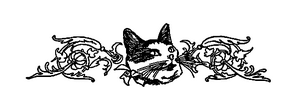
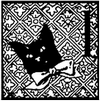
IT was Detective Gilbert who told the story to a group of boarders seated on the piazza of one of the quaint old Rhinelander houses. These dwellings, though situated on West Eleventh Street, in the very heart of New York, present an almost rural spectacle, with their green lawns, wide piazzas, and vine-covered balconies.
"It was one day about two years ago," said Mr. Gilbert, "that I received a card on which was engraved the name, 'Miss Julia Wood.' The name was a familiar one. When my wife was living Miss Wood had been an intimate friend of hers and a frequent visitor to our house. Since then I had lost trace of the girl, and knew only that, owing to her father's death and the straitened circumstances of herself and her sister, she had taken up the study of stenography and typewriting, with the idea of earning her living. So when she rose to meet me in the reception-room I was startled by her changed appearance and the haggard, anxious expression of her face."
" 'Mr. Gilbert, I am in great trouble,' she exclaimed, as I shook hands with her, and then, without further preliminaries, she stated her case.
" 'You know, Mr. Gilbert, that for over a year I have been studying stenography and typewriting, and you can understand that lately I have been very anxious to find a place. At first, I supposed that this would not be difficult, but I soon discovered that my lack of practical experience stood in the way of my getting anything at all. In fact, it was not until this week that even a temporary opening presented itself.'
"Here Miss Wood paused for a moment, as if to summon all her strength, and then continued:—
" 'About eleven o'clock yesterday morning, my teacher, Mr. Lacombe, [Pg 18] came to the door of the practice room, where I was at work, and, calling me to one side, said:—
" ' "Miss Wood, didn't you tell me that you understood the deaf and dumb alphabet?"
" ' "Perfectly," I answered.
" 'As you know, Mr. Gilbert, my little sister Helen is deaf and dumb, and that is why I understand the sign-language almost as well as I do spoken English.
" ' "I thought so," said Mr. Lacombe, "and am glad, for your sake, that you do, for I've just had an application from a lady who wants a deaf and dumb stenographer."
" ' "But I am not deaf and dumb," I protested.
" ' "No, but you understand the sign-language, and that is the main point. You see, this woman wants some notes taken from a deaf and dumb relative, who uses, of course, the deaf and dumb alphabet, and she thinks, I suppose, that a person who understands the sign-language must be a deaf mute, also. She says that this relative of hers is ill; possibly hasn't long to live. So no doubt you're wanted for some sort of an ante mortem examination; one, maybe, that's connected with some family scandal or secret that they don't want to leak out. Just a matter for discretion, that's all.
" ' "Of course I don't want to urge you into this against your will," he added, "but I know how much you want a position and a chance for practical experience. Besides, this engagement is only for a week, perhaps even less, and the salary is fifty dollars and all expenses paid. The main question is whether you care to be deaf and dumb for that time."
" 'For just a moment I hesitated. Certainly the conditions were very queer. Still, there was the money,—how much fifty dollars would mean for my poor little sister! There was the experience, and there was, yes—I must confess it—there was the charm of adventure. You know you always said that I was of an adventurous disposition, and that spirit has grown since I have been thrown upon my own resources, and have made up my mind that I must make my own way in the world, as if I were a man. As for acting the part of a deaf mute, that seemed a simple matter to me, who know so well the habits of [Pg 19] the deaf and dumb, through constant association with poor little Helen.
" 'Money, experience, and adventure! The combination was too much for my prudence. In less time than it would take to buy a handkerchief I had accepted the position. Forty-five minutes after the time that I walked into Mr. Lacombe's office I sat on a Southern-bound train, rushing towards a place I'd never heard of before, the companion of a woman who was an utter stranger to me, and bound on an errand of which I knew practically nothing.
" 'You see, in the rush of preparation I'd no chance for reconsidering my decision. Indeed, when I was led into Mr. Lacombe's inner office and introduced to my prospective employer, Mrs. Westinghouse, by means, of course, of pencil, and paper, and gestures, I hardly noticed in my excitement what manner of woman she was. I had enough to think of in keeping to the character I had assumed and in preparing in half an hour's time for a week's journey; for almost the first demand made by the strange woman was that I should go with her upon the noon train. The invalid had no doubt only a few days left to live, she explained, and every minute was precious.
" 'Upon reading my pencilled explanation that I must go home to say good-by to my sister and get a few articles for my trip, she thrust a ten-dollar bill into my hand, telling me to use that to buy whatever I needed. Mr. Lacombe, she signified, could explain matters to my sister, and with that she hurried me down the stairs and into a cab waiting below. In this I was whirled away, first to a big department store and then to the railroad station, arriving just in time for the noon train, so it wasn't until I was seated in the local express and had actually started that I had a chance to review the situation and to examine my companion.'
" 'What sort of a woman was she?' I interrupted.
" 'Oh, she appeared perfectly respectable, and tried to make herself agreeable by keeping me busy answering questions on my pad, but something in her cold gray eyes, or, perhaps, in her high metallic voice, chilled my ardor. For the first time I realized my position. Here I was about to enter into the lives of unknown people, under an assumed character, and one that might involve [Pg 20] me in matters of a secret, perhaps a dangerous nature. By this time, however, it was too late for me to retreat. All that I could do was to vow, as I did with all my heart, that no matter what I learned while with these people I would make no use of it.
" 'Upon leaving the train, after a ride of about two hours and a half, I found myself in Rockwood, a desolate little way station in the most dreary section I had ever seen. The only sign of life was a top carriage, drawn by a pair of lean horses and driven by the son of my companion, a man about thirty years of age. He had handsome features, but, somehow, his bloodshot eyes and dissipated look impressed me even more unfavorably than had his mother's appearance. I was directed to take the back seat, and Mrs. Westinghouse sat in front beside her son.
" 'As we drove off the young man put a question at once which I did not hear, but his mother in her usual voice assured him that I was a deaf mute and had been secured at a large salary for that reason. Then they proceeded with their conversation without restriction, but the road was so stony and our speed so great that I caught only a little of it. What I heard did not serve to make me feel any easier. They spoke of some person, who appeared to be a relative, with the most dreadful epithets, and appeared to be planning some way to bring him to terms, should he prove obstinate after they arrived with the stenographer. Before we had gone a mile I was not only sick of my bargain, but ready to jump from the carriage to escape it.
" 'The aspect of the country, also, was enough to make the most hilarious person feel melancholy. It was rocky, sterile, and almost uninhabited. The few farmhouses we passed were, all save one, untenanted and falling to pieces. The fields were covered with a thick growth of bayberry bushes or stunted firs.
" 'The house was, as nearly as I can judge, about three miles from the station. It had once been a fine mansion, but showed signs of neglect and age. The paint was worn off in patches; the floor of the piazza was rotten. The inside of the house, however, was fairly comfortable, the furniture being extremely old-fashioned and quaint.
" 'I could hardly touch a mouthful of supper, and soon excused myself from the table. Wandering around the piazza [Pg 21] which skirted the house, I came upon a rear view of the premises. Here I had another surprise, for, detached from the main house and several yards away, stood a long, low brick building with a huge chimney, like a smoke-stack, proceeding from it. Its windows were close against the roof, and probably about twelve feet from the ground, while the only entrance seemed to be by way of a rough bridge extending from a curious door on a line with these windows to a window in the second story of the dwelling-house.
" 'While I stood gazing at this remarkable building I noticed that Mrs. Westinghouse had followed me. I could no longer restrain my curiosity, but pointed to the mysterious building and raised my eyebrows. With an impatient gesture, as though she resented my inquisitiveness, the lady caught up my writing-pad and scribbled: "It is my brother's laboratory; he is a metallurgist. We wish you to come and take a dictation from him."
" 'Then, leading me upstairs, she unlocked a door and ushered me into a large apartment, in which, at that moment, I saw only one object,—a man stretched upon a couch. The coverings, thrown away from the neck and face, revealed both to be shockingly emaciated; the eyes were wild and staring, the lips drawn away from the teeth, which were white and even. But there was strength even in that dying despair—at the first glance I saw that. There was a look of dogged endurance in every line and feature.
" ' "Now, Alfred," wrote Mrs. Westinghouse upon my pad and signifying to me that this was my introduction, "here is Miss Wood, a deaf and dumb stenographer we have brought from New York, so there's no longer any reason for your keeping your precious secret. She understands the signs, and can put your words on paper as fast as you can give them to her." Then, passing the pad to the invalid, she turned to her son. "Victor, love," she said, "the writing paper, pencils, and a little table for Miss Wood."
" ' "Here they are," said the young man, rolling the table towards me with an ingratiating leer.
" 'I glanced at the invalid. He gave no sign of having read his relative's communication, but lay quite still and breathed [Pg 22] softly in gasps. I should not have been surprised to have seen him drawing his last breath at any moment.
" 'The woman stood looking at him appealingly until she caught his eye; then she covered her face with her handkerchief, pretending to be overcome by emotion. A moment later she turned aside to Victor and hissed, "Oh, is it too late? If I only knew some torture that would wring from him that secret which would bring us millions."
" 'Then, controlling herself, she went on more calmly: "Sit down, Miss Wood, and take the dictation."
" 'I saw Victor looking at me and had the presence of mind to remain perfectly quiet, without noticing what she said, for, indeed, I had now begun to feel that I was among desperate people, and that it would be best for my well-being to carry out my role as I had begun it. Apparently satisfied that I was as unfortunate as I claimed to be, she signified by motions that I was to seat myself and write as soon as her brother should dictate.
" 'I did so, but while Victor had been occupied in arranging my utensils and Mrs. Westinghouse was absorbed in her pretended emotions the man on the bed had turned his eyes and looked straight into mine. The effect was tremendous. I felt calmed. There was almost an understanding between us. At least, there was sympathy.
" 'As I seated myself and caught up my pencil, he raised his white hands and began to sign to me:—
" ' "Show no fright at whatever I say. Pretend to take notes, or you will betray yourself."
" 'Acting on his suggestion, I began tracing disjointed sentences upon the paper.
" 'Then, after allowing me a few moments to recover from the effects of this startling communication, he went on:—
" ' "This is no place for you. These people are desperate characters, and if they suspected what I am saying might injure you."
" 'Again a pause, during which I shaded my face with one hand and scrawled senseless marks over the paper with the other. Beneath my lowered lids I could see that two pair of eyes, one bloodshot and the other steely gray, were watching me from a [Pg 23] shadowy recess on the other side of the bed. I realized that the slightest expression of my real feelings might prove fatal. I set my teeth hard. My old adventurous spirit returned. As mechanically as though I were taking a school dictation, I followed the movements of the trembling white hand and traced those meaningless marks.
" 'Apparently, mother and son were satisfied with their scrutiny, for they soon retired to the other end of the long room. As they went, I heard her murmur to Victor:—
" ' "Come; the old miser won't forget his own flesh and blood. At any rate, that girl shall stay in the house until her notes are written out in plain English and the experiments made. I gave that foolish teacher of hers a wrong address."
" 'At this she turned on me suddenly, and nothing on earth could have prevented my face revealing the fright that was on me. I could hide my terror only by sneezing violently into my handkerchief.
" 'As soon as they had withdrawn to the farther end of the room the invalid hastened to communicate as rapidly as possible the state of affairs in this strange household. The woman, Mrs. Westinghouse, was, so he said, his sister-in-law, the widow of his only brother, and Victor was, of course, his nephew. On the death of his brother, the man who now lay dying had invited the widow and her son, then a handsome lad, to make their home with him, and, indeed, had treated Victor as his adopted son and probable heir. About three years ago, however, Victor, who had acted as his uncle's assistant in the laboratory, had repaid his generosity by attempting to steal from him the secret which he had spent years in perfecting. Failing in this, he had forged his benefactor's name for a sum amounting to a large share of his fortune, and had applied the proceeds to the payment of gambling debts. Since then, Mr. Westinghouse, though allowing Victor to go free, had refused to see either him or his mother, and it was only now, when he was on his death-bed, that they returned, uninvited, with the hope of extracting from the sick man the only wealth remaining to him,—his recent discovery.
" 'At this point the invalid stopped abruptly, and looked once more deep into my eyes. Then, with a sigh that seemed one of satisfaction, he continued:—
[Pg 24]
" ' "They think, because they hold me as prisoner here upon my death-bed, have deprived me of society, and spirited away my faithful man-servant, the only person who understood my sign-language, that they can force my secret from me. But your face tells me that I can trust you, that you are not their accomplice."
" ' "Indeed I am not," I signed hastily. "I came here ignorant of what I was to do, and now they say that I must stay until the notes are written out and the experiment is made. If it fails it is likely to go hard with both of us."
" 'The invalid received my communication quietly, without asking how I gained my knowledge. Then, after asking and receiving answers to several questions in regard to my history, he nodded as if satisfied, and signed me to take down with extreme accuracy what he should give me. He then dictated by means of the sign alphabet what seemed like a technical article, many words of which he was obliged to spell for me, and including the finest weights and measures relating to metallurgy. After he had completed it he asked me to read it to him by signs, so that he could be sure that it was correct. When I had done so he looked up, smiled faintly to see that mother and son had left the room, and beckoned me to him. He took my hands, clasped them in his, and then signed: "Swear that you will never permit that paper to fall into the hands of Mrs. Westinghouse or her son."
" 'In my fright I took the oath.
" ' "Guard it well," he signified, "for it is a fortune beyond your dreams. Now sit down and take a bogus paper, which you must give to Mrs. Westinghouse. But first conceal this paper in your dress."
" 'I did so. He then dictated another paper, different in every way from the first as to its methods; and then motioned that I must write out the second paper as soon as possible, give it to Mrs. Westinghouse, and then effect my escape before the fraud was discovered.
" 'As I looked at him doubtingly, he added: "Trust me. I will provide the way."
" ' "But you?" I said.
[Pg 25]
" 'He tried to laugh. "I shan't live twenty-four hours," he said.
" 'I asked if they were to blame. He shrugged his shoulders. "Her son's treachery robbed me of health and fortune. And now in their fiendish greed to inherit the secret they have locked me in this room and tried to wring it from me by their soft words and wheedling caresses. But they shall not succeed. They shall never know this."
" 'As he spoke he drew from under his pillow a small blade in a sheath. It was a bright brownish yellow; the edge was sharp as a razor. He handed it to me, signifying that I was to keep it.
" 'Hardly had I sheathed the strange weapon and concealed it in the folds of my bodice when the door opened and the woman again entered. I showed her the pages that I had taken and pencilled a note, saying that the formula was complete, but that it would take at least half a day to write it out, as it contained many unfamiliar terms which I should need to refer to a dictionary. For just a moment the woman scanned my face and that of the invalid with that strange air of suspicion that never wholly deserted her.
" 'Apparently, what she saw satisfied her, for she signified her pleasure that I had succeeded in gaining the information in so short a time, and added that, as it was now past midnight, I might leave the rest of my work for the next day. Upon this, she led me to a room opening out of her own, indicating that she thought I might feel less lonely if I were near her. Later, I heard the key turn softly in the lock on the outside of the door leading from my room into the hall, and—well, you can imagine that I got very little sleep that night.
" 'Early the next morning the woman unlocked my door, and, after I had eaten a hasty breakfast, led me to a library well equipped with reference books, where, so she wrote, I was to finish my work.
" 'Then she left me, locking me in once more.
" 'I had reached about the middle of the false formula when the door opened and the woman entered in great haste. From her hurried movements and the anxious expression of her face I judged that some new complication had arisen. I was right. [Pg 26] Snatching up my pad, the woman wrote, "He is sinking fast. The experiment must begin at once. How much of the formula remains?"
" 'I wrote: "Over one half."
" ' "Never mind," she wrote in return. "Victor can begin with what you have. Give me the papers. You may finish the rest in my brother's room and bring it to us in the laboratory."
" 'As we entered the invalid's room, I tried to exchange a look with the sick man, but the woman drew me away to a large French window at the end farthest from the bed, and, opening the sashes, which swung inward, motioned me to look out. To my surprise, I saw that the bridge that I had noticed the night before as connecting the house and laboratory was approached from this window. It was a rough affair, resembling those used on shipboard, and consisted of a wide plank guarded only by two ropes stretched one on either side of the plank, about three feet above it, as a sort of guard rail. On the laboratory side the bridge terminated at what seemed to be a heavy door, made of one solid piece of timber and provided one third of the way from the top with two small windows, or, rather, panes of glass, about eight inches square. Behind each there was a heavy iron bar.
" 'Hastily signifying that I must cross the bridge in order to bring her the remainder of the formula, the woman sent Victor ahead and then turned to follow. Before going she intimated to me that while I wrote I was to remain beside this window where I could see any sign from the workers in the laboratory and be seen by them.
" 'For the next two hours nothing was to be heard in the room save the scratching of my pen over the paper and the labored breathing of the dying man. He seemed to be sinking rapidly, but whenever he caught my glance would smile reassuringly, as though to say: "Do not be afraid. All will come right." As the hands of the clock on the mantel approached the hour of eleven, however, he appeared to grow suddenly stronger; a faint color tinged his cheeks, and he half rose in bed, as though awaiting some new developments. On the stroke of eleven he turned to me and signed: "It is time to go."
" ' "But there are still a few pages to write out," I answered.
[Pg 27]
" ' "It's all right," he rejoined. "It is enough. Only go—go at once. It is your way of escape."
" 'For a moment I hesitated. The words sounded senseless; sick men, I reasoned, had strange fancies. But the glance of his eyes was sane; it was more,—it was convincing.
" 'Without another word, I gathered up my papers and started across the bridge. It swayed, but only slightly. There was not the slightest danger of an accident. And yet in my passage across that bridge I trembled violently. When finally I reached the strangely guarded door I had barely strength enough to knock upon the heavy timbers. There was no reply. Evidently they were absorbed in their experiment, I thought, and knocked again. Still no reply, though this time I seemed to hear a faint movement within. I tried to peer through the tiny window-panes in the door. They were somewhat above the level of my face and partly obscured by the iron bars. So I raised myself on tiptoe and, shading my eyes with my hands, looked in.
" 'For a moment I could see nothing. Then, as I became accustomed to the gloom, I made out a few objects near by,—a charcoal stove, a table holding a pair of scales, pincers, blowpipe, a graduating glass, and other apparatus with which I was unfamiliar. At the farther end of the table sat a motionless female figure, the head thrown back, one hand clutching a crumpled sheet of paper, while the other hung limply at her side. Directly opposite a man sat, also motionless, his bowed head resting on the edge of the table. As I looked, I fancied the hand holding the paper twitched slightly.
" 'I shifted my position. A faint light fell upon the face of the woman. It was that of Mrs. Westinghouse, but white and rigid, with sightless, staring eyes.
" ' "They are dead!" I cried, as I rushed back into the room of the dying man. Then, recollecting myself, I succeeded in repeating my words with fingers that trembled so that I could hardly give the signs.
" 'For a moment he seemed unmoved; then, with a ghastly smile, he signalled:—
" ' "This is your time to escape."
" ' "But you—"
[Pg 28]
" ' "Never mind me. All I care for is to keep my secret from them. Remember your vow—and now go—go—and God bless you."
" 'I grasped his hand, then rushed from the room. I snatched my hat and coat in the hall below, and ran out of the house and down the road, never stopping until I reached the station. There I took the next train and reached the city only half an hour ago.' "
Here Mr. Gilbert began to light a cigar, as though his story were finished.
"But what became of the dying man—of the mother and son—the little stenographer?"
"Oh, yes, to be sure," said the detective; "you wish to know the sequel. Well, I went up there that day with two or three men and found everything as she'd described it. The mother and son had simply been evidently stupefied by drugs purposely introduced into the false formula, and soon recovered their senses, but the uncle had breathed his last. Mrs. Westinghouse had been smart enough to get a physician, who was there when we arrived, and who, honestly enough, I suppose, ascribed his death to natural causes. We could do nothing from lack of evidence."
"But the secret,—the mysterious formula?"
"Ah, that is the saddest part of the whole affair. Half crazed by her horrible experience in this house, and recalling her vow to make no use of any information gained while there, Miss Wood had no sooner escaped than she tore the true formula into pieces and threw it away. Had she kept it, it would undoubtedly have brought her an enormous fortune, for an expert metallurgist who examined the strange dagger given to her by the dying man pronounced it to be an example of a priceless art,—that of tempering copper to the consistency of steel,—a process understood by the ancients, but lost now these thousands of years."
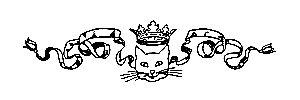
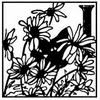
IT was because the doctor insisted that my system needed ozone that I went to Colorado on a hunting trip. It was there that I met her, and it was there, by the way, that I became convinced that when a man with a lame lung undertakes to hunt ozone in the wilds of the Rocky Mountains he ought to provide himself with a guide. I went alone, and that's why I got lost.
For two days I had tramped, half starved, toward the rising sun, with the hope of reaching some cattle ranch near Denver. On the morning of the third day, as I was trudging through a thick undergrowth, I was suddenly startled by a woman's voice:—
"You didn't happen to spy a little speckled heifer back yonder, did you, stranger?"
It is said that upon the approach of a human being the first impulse of a man who has been lost in the woods is that biblically ascribed to the wicked, namely, "to flee when no man pursueth." But at this time I was too far gone with hunger and weariness to flee from anything.
I simply leaned against a tree trunk and awaited the appearance of the voice's owner. She came riding a bronco across the crest of a hillock. She was slight and wiry, and she wore her huge sombrero and man's canvas shooting-coat with an air that at first suggested the cowboy. A later glimpse of feminine drapery, however, proclaimed her something infinitely more interesting,—a real Rocky Mountain cow-girl in all her glory.
"No," I answered weakly to her repeated question as to the heifer's whereabouts. "No, I've seen neither hoof nor hide of your heifer, which is lucky for you, as I should probably have eaten it if I had."
"You do look hungry," said the strange horsewoman; and as [Pg 30] she spoke the bold lines of her aquiline face relaxed into an expression of womanly solicitude.
"Here, take this," she added in a business-like tone, producing from a bag that lay, meal sack fashion, across her saddle, a can of pressed beef and a square foot or so of corn bread. "No," as I tried to speak, "never mind explanations. Have some lunch with me and talk afterwards; that is, if you ain't afraid to eat with a cow-girl.
"You see," she continued, when we were comfortably seated on a moss-grown log that served as a whole set of dining-room furniture, "I know myself what it is to get lost and nearly starve to death. 'Having experienced misfortune myself, I know how to pity others.' "
I choked over a morsel of corn bread and stared at my companion with ill-bred astonishment. A cow-girl who quoted Virgil, even in a translation, was something not dreamed of in my philosophy.
"Yes, I don't wonder that you look surprised," said my hostess good-naturedly. "I suppose I don't look as though I was up in the classics, but the fact is I'm a graduate of Iowa Wesleyan University, and I've studied Latin, Shakespeare, geometry, and all the rest.
"Yes," musingly, "once I expected to pursue a literary career. Indeed, my professors all told me that I might become the George Eliot or Mrs. Browning of America. But that speckled heifer I was asking you about just now knocked all my plans into a cocked hat."
"How was that?" I asked.
"Well, it was like this," said the cow-girl college graduate, as she pushed aside her corn bread, untasted, and, planting her elbows upon her knee, propped her chin upon her palms, man fashion. "In the spring of 1885, several years after I had graduated, my father died, and mother and I came to Colorado and bought a ranch at Plum Creek, some twenty-three miles south of Denver. You see, my father had been an invalid, and ever since I can remember we'd been chasing round from pillar to post, trying to find a climate that agreed with him; so this was really what you might call the first chance I had to go to work in earnest. It was [Pg 31] a lovely quiet spot, an ideal place, I thought, for communing with nature and pursuing a literary career. But it was not so to be. Like—what's his name with a tender heel?"
"Achilles?" I suggested.
"Yes, like Achilles, I had one weak spot that was going to be my ruin. I was crazy about pets. Why, if it hadn't been for that weak spot I might be wearing literary laurel instead of lassoing cattle—but this is neither here nor there. What I was going to say was that before I'd been settled on that ranch three days some men came our way driving a herd of Texas cattle to Denver, and, as a late snowstorm came up just then, they decided to camp on good feed in the hills in front of my ranch. That afternoon they came over to our house to buy bread, and while they were there they mentioned to me that they had a nice cow that had just calved, and offered if I would buy the cow to throw in the calf, as they were just going to kill it. Well, here was where my weak spot came in. No sooner did I hear about those animals than nothing would do but that I should have them for pets. Besides, the cow was offered mighty cheap, only eighteen dollars, while I'd been going without milk rather than pay the fifty or seventy-five dollars asked for a milch cow; so now I thought was my chance to close a good bargain and get two nice pets, beside. Yes, sir, I even planned while the men were gone after those animals how I would domesticate them in a few days."
"And it took longer?" I asked.
"Domesticate! I might as well have tried to domesticate an active volcano—but I mustn't anticipate.
"My first impression of my pet cow wasn't exactly encouraging. I had imagined her ambling serenely up to the house, mild-eyed and gentle, with the little calflet trotting at her side. Instead, she was dragged upon the scene by four men who had spent at least an hour in catching her and bringing her to me. The calf, meantime, after an equally exciting chase had been led up and tied to a large plum bush.
"However, I wasn't one to let a little thing like that phase me. I was determined to make friends with that cow; so when, about two hundred yards from the house, the men threw her and took [Pg 32] off the rope I advanced with that idea. But I wasn't half so anxious to make friends as the cow was. As soon as she set eyes on me—and if ever an animal had the evil eye, that cow did—she made a bee line for yours truly.
" 'Look out,' shouted the men. But I was already footing it pretty lively towards the thicket where the calf was tied, the cow after me, snorting like a steam engine almost in my ear. The next thing that I knew I had slipped and fallen on the ice in the north side of the bushes with the cow on top. I believe that I tried to grab the creature by her horns, with a wild hope that I might hold her down until the men came to the rescue.
"I might as well have tried to hold down a hurricane. As she rose so did I, and was on my feet twenty yards away before she could see where she was at. Just as she rushed from the bush and lunged after me, I saw a rope swing through the air, and the next thing that devil-possessed cow knew she was tied to a clump of thicket and left to meditate upon the evil of her ways."
"What did the men say to this?" I asked.
"Of course they made out that they were awfully surprised at the cow's antics, fearfully scared at my close call, and all that; but I saw them grinning and chuckling as if they were ready to burst as they rode off, and I felt dead sure they'd planned to have a double funeral, cow and calf both, if they hadn't found a tender-foot to unload them on.
"However, I never was one to give in that I was beaten by anything, first off, especially by a cow. Besides, that idea of having two nice pets had got a great hold on me. I made up my mind that if kindness could reclaim that erring cow she should be coddled like an infant. So next morning, bright and early, I started for the plum bush where she and the calf were tied, determined to make peace. Fortunately, two gentlemen, who had heard of the episode of the day before, rode over to see me that morning and joined me on my peace-making expedition. No sooner did the cow see me within thirty feet of her than she gave a fearful surge; the rope that she was tied with—worn thin by rubbing against the tree all night—gave way, and the cow made for me as though fifty devils had taken possession of her and were urging her on.
[Pg 33]
"I tell you I didn't stop to think about the power of kindness on the brute creation. I simply yelled, 'Murder,' and made for a sand gulch near by as though a band of wild Indians were on my trail. As I reached the gulch and dropped ten feet or so down the steep bank, digging my heels into the loose sand to stop myself, that acrobatic cow sailed straight over my head and lit about twenty yards below. At first I thought that she was dead, but no such luck. In a moment she got up, looking foolish and dazed, but very much alive, and began shaking her head and pawing fiercely, when the two gentlemen reached down and lifted me out, as much as to say, 'This is what I'll do when I get hold of you.' "
"Which she didn't, I hope," I put in.
"No, indeed; you can be precious sure that I took particular care that she didn't have another chance to get hold of me or to get back into the yard again. For an hour or so after she had hoisted herself out of the gulch she stood outside the fence that separated the yard from the field, shaking her head and pawing whenever she saw any of us at the doors or windows. At last, towards evening, she trotted off with a zigzag wabble down the bank towards the creek among the willows, and there she lay in ambush, you might say, so that for a week after we didn't dare to go down to make a garden or do anything else, for fear of having that cow descend like a wolf on the fold."
"And after that week?" I inquired.
"Well, finally she grew bolder, and ventured on the mesa near the railroad track, where she made war on the section hands, and I was warned that I must take her out of the field or they would shoot her. So to prevent her from demoralizing the entire neighborhood I had her killed and used her for beef. And tough eating she was," said my hostess, laughing; "but in any case she was better dead than alive, for there wasn't room for that cow and me in the same country."
"But you've been telling me about the cow. What about the heifer? I thought that you said that she was the cause—"
"Oh, yes. The heifer was the calf. Now, whether the cow disowned the calf, or the calf the cow, I never found out. Anyway, the day that the cow disappeared into the bottom land that little [Pg 34] calf trotted up to the house and tearfully begged to be loved. Well, you might have thought I'd had enough of pets for one while, but, no; the helplessness of that poor little calf so went to my heart that for weeks I rode nine miles every day for milk, and fed it to that little creature with my own hands."
"A sort of foster-mother," I suggested.
"Yes, I was a mother to that little orphan calf. But, if you'll believe me, it was a case of 'how sharper than a serpent's tooth is an ungrateful child,' or however that goes. Yes, sir, that calf followed in the evil course of its mother, only if anything it was worse, sort of like Agrippina and her son, Nero, only this was a daughter.
"You see, the cow was perfectly open about her evil deeds, but the calf was underhanded. After trotting around me, looking as innocent as though butter wouldn't melt in her mouth, she'd all of a sudden disappear, and come back after a few days with an ear torn and the skin raked off her side; and pretty soon I'd hear that she'd been attacking horses or fighting other cows.
"One day she chased an unlucky workman out onto the railroad bridge and kept him there until a train came along and the engineer slackened enough to take him on and carry him to Plum Station. Another time she got after a tramp that was camping on the bottom land among the willows, and forced him to take refuge in the forks of a crooked tree, where he roosted until one of us went down and called off Miss Bossie. In fact, the only return that calf ever made for all my loving care was to scare away tramps. If I could have kept her around the house just for that purpose she would have been one of the best investments I ever made.
"But as years went by that calf became more and more abandoned to evil. She would wander farther and farther from home, until now I spend half my nights worrying about her and more than half the day following her up and taking her home with me."
"I should think you'd get rid of the creature," I interrupted.
"Kill her? Yes, I suppose that would be the most sensible thing to do, but you know how it is about always loving the prodigal son the most. Yes, sir; wherever that animal goes it [Pg 35] takes my heart with it, and, though it's nigh onto eleven years old, I never can think of it as anything but a pet calf."
"And so it was bringing up that heifer that interfered with your literary career?"
"Interfered? Well, I should say so! Back at the start I did publish some poems in the local papers, and I read one or two essays at the Zion Church literaries. But people wouldn't believe they were original. No woman, they said, who spent her time chasing wild cows over the country could write odes to spring and essays on Shakespeare.
"My literary career was killed, blighted in the bud. And, as my income was small and I had to do something to make out a living, I've just turned my hand to anything that came along.
"Instead of gaining fame as the American George Eliot, I've been called Colorado Cow-girl and Bronco Buster. Instead of wielding the pen, I've driven a four-horse stage, branded cattle, broken saddle horses, sung in a church choir, run a blacksmith's shop, kept school, given music lessons, run a hotel, taught painting, carried mail, roughed it on horseback all the way from Colorado to Oregon, and taken a hand in pretty much everything else, except shoveling wind off the roof. But there"—breaking off suddenly—"you aren't interested in all this. What you want now is rest and shelter.
"Take my outfit and make tracks for Wilkins ranch. Just give the pony his head and he'll land you all right.
"It's over that way," rising and gesturing toward the southeast.
I tried to protest against this plan, but the Colorado cow-girl was already several yards away.
"That's all right; meet you later at the ranch," she cried, turning for a moment before she plunged into the thicket. "But first," she added, with almost maternal solicitude, "I think I'll just look around and see if I can't find that little speckled heifer."
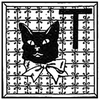
THE royal Malay tiger is no gentleman. If he were, the following would never have been told.
Punda-Tsang was an innkeeper. He was sole proprietor of the Ballawari-Dâk, which is a very big name for a very small native hotel about sixty miles north of Penang, and on the high road to the hunting-steppes of the Bukit, or hill-country. The quaint little hospice clung to the mountain side like a swallow's nest, high over the jungle-bedded Sungei, whose foaming, crashing torrents came down from the upper mountains like an endless charge of white cavalry to the sea. Punda was a good sort of a Malay, which means a bad sort of anything else. That is, he would plunder only on the securest principles, and never quarrel with a bigger man nor a better armed one than he. In this he differed from other Malays, who would plunder and knife upon no principle or provocation whatever, if they thought there was a ten-anna piece in the job.
But a deeper reading of this prosperous boniface of the jungles revealed the fact that he was capable of love,—yes, even a tender, human affection; and that little Iali, his five-year-old daughter, was the object of a worship in his heart even more fervent than that which he bestowed upon the five home-made clay gods before which, in a dark corner of the Dâk, he burned a vast deal of ill-smelling punk. The second year of Tsang's married life had hardly begun when his beautiful wife was bitten by a yellow viper while gathering healing herbs down in the valley. When they found the poor creature she was dying—with a little new-born babe in her arms. This calamity the bereaved husband regarded as a direct visitation of the clay gods in the corner; only the day before he had robbed a Kling hunter of his [Pg 37] rifle, leaving the poor fellow to make his way unarmed down to the sea, where he ran upon a pair of half-starved kukangs, a vicious species of Malay chimpanzee, in fleeing from which he fell over the cliff and was dashed to pieces. And Punda-Tsang always felt that that yellow viper was sent direct from the land of the judging gods to avenge the blood of the poor Kling hunter. But there was one thing that mitigated the harshness of this vengeance,—the presence of the little child, whom he tenderly cherished, and whom he had called Iali, which is to say "forgiven." But even were not the little creature a messenger of forgiveness to the penitent savage heart, she was more than worthy his worship and love,—this child of the tropic forest, restless and agile as a young panther, with lustrous black eyes and a wild, wayward nature, much spoiled by the wayfarers and fawned upon by the coolies that swarmed about the compound.
One day two British naval officers stopped at the Dâk on their way down from a hunt in the hill country. We were seated under the palms before the bungalow after tiffin, smoking cheroots, while I listened to their exploits with interest. Suddenly four native Malays approached, wheeling a live tiger in a clumsy wooden cage, and halted before the Dâk. They were going to dispose of him to a naturalist down on the coast, who had a method of killing and stuffing animals by which the marvelous luster of their skins was preserved. The forest king was certainly a magnificent specimen. If you have never seen a live tiger fresh from the jungles, take my word for it, the ordinary caged tiger at the Zoo is as much like the former as canned strawberries are like the fresh, lustrous fruit of June. The Englishmen evidently thought so, too, as they concluded to buy him, and swear that they had captured him, and then to present the beast to the London Zoo. They bought the animal for forty Mexican dollars, sent the natives back rejoicing, and started down towards the coast, while Punda-Tsang, not contented with exacting fifty per cent commission from the poor fellows for using his Dâk for a tiger mart, committed the meanest act of his life. He slyly sawed one of the cage bars nearly through in four places. Then he went to work planning to waylay the tiger on his way back to his haunts after he should break loose, which he knew would happen before the [Pg 38] Englishmen could get many miles down the valley. He quietly pursued his planning until late that night, when he heard upon good authority that the tiger had broken jail and nearly killed one of his owners. Then he prepared to put his plans into action.
Here we reach the illustration of the first-mentioned fact, of which Tsang was ready to take advantage: that the Malay tiger is no gentleman. He knew that the beast will never walk up leisurely and take his bite like a smooth and oily clubman at a free lunch, but that the very instant that he smells blood he will drop flat, and, even if the feast is a mile away, will begin a slow, creeping journey towards it, wasting hours, perhaps, and working up a terrific hunger in the meantime. When he has approached within twenty feet of the prize, quivering with desire and terrible with greed, he will leap into the air like a cannon ball and plunge down upon his victim. Punda-Tsang knew all this; so he dug a pit down the valley, constructed a network of branches over it, and laid the quarter of a bullock upon it. Then he waited for the tiger to scent the blood and make his slow, crawling journey, knowing that when he made the grand twenty-foot leap he would go crashing through the network into the pit below. Then Tsang planned he would starve the beast, let down a cage baited with more fresh meat, and, sliding the bars from above, haul the captured tiger out and sell him over again. All of this might have happened, but it didn't. Events somewhat stranger and more terrible for Punda-Tsang interfered, doubtless as another direct visitation of the vengeance of the little clay gods in the bungalow corner, half concealed in clouds of punk-smoke.
As little Iali was the innkeeper's constant solace and companion, she went with him to the pit-digging, her father explaining to her the manner of capturing the "four-footed jungle-god," which facts, instead of frightening the child, only helped to increase the stock of her play gods and demons which she molded deftly from the red clay of the ravine. With the appearance of the new moon, that mascot of the Orientals, the pit was baited. For two days nothing was heard of the tiger, and Punda-Tsang began to fear that he had gone back to the hills by another route.
On the afternoon of the third day I sat on the cliff's edge, watching the mists rise from the roaring river bottom, a phenomenon [Pg 39] which always accompanies the closing day. Suddenly there was a great shuffling of sandals about the compound, and I knew something extraordinary was taking place. I turned quickly; the big form of Punda-Tsang, the innkeeper, burst upon me suddenly, his flat face as pallid as a demon's, ferocious, but with the ferocity of nameless fear.
"Iali!" cried he hoarsely. "Have you seen Iali?"
"No!" I replied, almost in a whisper. He did not wait, but sped towards the so-called bullock-sheds, which were really caves cut in the solid rock beyond the Dâk. I had become attached to the child, whose marvelous beauty had charmed, and whose weird ways mystified me. But I had never been alone with her, knowing that any accident happening to Iali while in my keeping would result seriously for me—perhaps cost me my life. The coolies were flying hither and thither, making the air ring with their loud wails. Such agitation on the part of these vagabonds roused me to a realization of the child's danger. Suddenly I turned my eyes and thoughts in the direction of the ravine where the tiger trap lay. I recalled vividly the child's interest in the "jungle-god" who was to be captured in the deep pit; and, knowing the little creature's absolute fearlessness, thought that, acting upon some childish impulse, she might have strayed down the narrow path to the pit. Meanwhile the wailing about me increased.
I dropped over the ledge, soon reaching the pathway by a short route. As I penetrated the jungle, now suffused with mist in the ruby glow of the expiring day, I realized with what risks to myself I was entering this dangerous spot, all unarmed. I was still debating whether or not to return for a weapon of defense, when, as I leaped over a soft spot in the red clay, I saw two footprints that shot terror into my heart; one was that of a mammoth tiger, the other belonged to a little child. I dropped down beside them. No. There was no mistaking them, so clear and fresh were both. I rose to my feet, my head whirling, my ears half-deafened by the noise of the jungle insects and the increasing roar of that river beyond. Then I crept forward, scarcely daring to breathe, my heart beating faster and faster with apprehension.
The distance to that tiger pit seemed to be doubled, and the [Pg 40] time that elapsed before reaching it everlasting. The crackling of the leaves and twigs on the moss beneath my feet added to my trepidations. Almost before I realized it I had reached the big trap, and then halted short, thrilled by the sound of something human. I looked up. Through the deepening mists and intervening boughs I saw the little child-figure of Iali creeping out upon the withered branches over the pit. For the instant I had no power to move, nor dared I speak, lest, overcome with sudden fright, the frail little one might lose her foothold. Suddenly a new horror disclosed itself. What were those two glaring, cold, yet fiery points just beyond the pit, burning their way through the shadows? My God! It was the tiger. He was lying flat on the ground, couchant, paws extended, quivering, ready for the fatal spring.
In moments like these one's reasoning powers become super-human. I saw that in all probability either Iali or I was to be sacrificed, which one depended merely upon the caprice of the wild beast. I had heard that the calm, steady, fearless stare of a human is more terrifying to wild animals than guns that kill. On the instant I resolved to practise it; it was my only expedient. So I stared at those two coldly bright and glowing points of light like a madman, without a quiver, without a doubt.
Suddenly I saw the little figure waver on the dead branches over the mouth of the pit, and then—oh, horrors! with a weak cry poor little Iali had lost her foothold and slipped slowly through the yielding boughs into the cave beneath. For a moment all was silent. Then I heard her childish prattle. The soft sand had broken Iali's fall and saved her life, while I was brought face to face with the most awful problem of my life. For what seemed hours, I stood like a pillar of stone, the sweat pouring down my neck, my tongue hot and parched. One show of fear would, I knew, be fatal. The "jungle-gods" are keen, like demons, measuring strength with man. How long could I keep up this maddening strain?—how long force upon the king-beast this illusion of my superior will?
Suddenly, as I stood like one in a trance, facing this growing problem, I was conscious of a stir in the reeds and underbrush at my right hand. Though the sound caused me to tremble, I dared [Pg 41] not take my eyes from the crouching monster beyond. The next instant, a strange, huge shape crept stealthily out of the underwood, and advanced into the clearing toward the pit,—a ponderous black monster with the body of a beast, but lifting through the grass the head and shoulders of a human colossus. It was a mammoth orang-outang!
The tiger crouched lower. He seemed to be as nonplussed, as stunned by the intrusion of this huge interloper as I was. In motionless silence, he transferred his burning gaze to the mammoth monster.
Advancing to the very edge of the pit, the huge ape slipped, but he recovered. Sly beast! He saw that the branches were only a blind. Then he walked around the edge of the trap, and knelt down like a human being, slowly, deliberately reaching out his long hairy arm till his giant hand clutched that bullock bone. Oh, what joy that calm, providential deed brought to my heart! Then, to my intense relief, the orang slowly dragged the great mass of flesh off the network of branches upon the solid ground.
For a moment longer the gleam of those two terrible eyes, now like peepholes into hell, followed the unsuspecting pilferer. Then came a rustle, a strange shriek like sudden thunder, a bound, and a roar, and the "jungle-god" had sprung into the air, and came down like a flashing avalanche full upon the broad body of the kneeling orang. A single paw struck the mammoth ape in the small of the back, and never shall I forget the sound of that blow which broke the bones of the orang's spine like a cannon ball. With an almost human groan, the rescuer of my life and hers I came to save gave up the booty, together with his own life. Then the tiger, with a final flash of eyes full into my own, snatched up the carcass of the bullock in his flaming jaws, and slid off into the thick of the jungle.
I have often wondered since how things would have turned out if that tiger had been a gentleman.
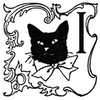
IT lacked three minutes of five by the big clock in the tower when the east-bound Chicago express rumbled into the station at Buffalo. The train had not yet come to a standstill when a hatless man jumped from the platform of the rear sleeping-car and ran across the tracks into the depot restaurant. A few minutes later he reappeared, carrying a cup of coffee in one hand and a small paper bag in the other.
With these he hurriedly made his way back to the car through a straggling procession of drowsy tourists, who were taking advantage of the train's five minutes' stop to breathe the crisp morning air. The last of these had already resumed his seat when the man without a hat again appeared at the lunch counter, returned the borrowed dishes, and ordered coffee for himself. He had just picked up the cup and was raising it to his lips when the conductor's "All aboard" rang through the station.
Leaving the coffee untouched, he thrust a five-dollar bill at the attendant, grabbed his change, and started in pursuit of the moving train. He had almost reached it when an unlucky stumble sent the coins in his hand rolling in all directions along the floor. Quickly recovering himself and paying no heed to his loss, he redoubled his efforts, and, though losing ground at every step, kept up the hopeless chase to the end of the station. There he stopped, panting for breath. The slip had proved fatal. He had missed the train!
As he stood staring wildly through the clouds of dust that rose from the track, a young woman, evidently deeply agitated, suddenly appeared in the doorway of the vanishing car. Upon seeing him, she made frantic attempts to leap from the platform, when she was seized by a man and pulled back into the car. When the [Pg 43] door had closed upon the two the bareheaded man in the station faced about and philosophically muttered:—
"It's fate!"
Then, after pausing a few moments, as if to collect his thoughts, he slowly retraced his steps to the scene of his mishap and began calmly searching for his lost change. Circling closely about, his eyes scanning the floor, he succeeded in recovering first one and then another of the missing coins, until finally, after repeated rounds, he lacked only one dollar of the whole amount. At this point he paused, clinked the recovered coins in his hand, looked at his watch, and then started on a final round. As this failed to reveal the missing piece, he gave up the search, transferred the contents of his hands to his trousers' pocket, and started in the direction of the telegraph office.
He had proceeded perhaps twenty paces when it occurred to him to turn about and cast one more look along the floor. As he did so his eye fell upon a shining object lodged in an opening between the rail and planked floor, a few feet from where he stood. He stooped to examine it, and, seeing that it was the missing coin, reached for it, but found the opening too narrow to admit his fingers. He tried to recover the piece with his pocket-knife, and, failing in this attempt, took his lead-pencil, with which, after repeated attempts, he succeeded in tossing it upon the floor.
With an air of subdued satisfaction, he walked away, and was about to convey the coin to his pocket when a sudden impulse led him to examine it. Holding it up before his eyes, he stopped, scrutinized every detail, and as he turned it over and over the puzzled look on his face changed to one of rigid astonishment. For fully a minute he stood as if transfixed; then, rousing himself and looking anxiously about as if to see if any one had observed him, he hurried to the cashier's desk in the restaurant, and, producing the bright silver dollar, asked the girl if she happened to remember from whom she received it.
She didn't remember, but would exchange it for another, she said, if he wished. Politely declining the offer and apologizing for having troubled her, he said that, as the coin he held in his hand was separating a loving wife from her husband, he wished very much to find some trace of its former owner. The girl [Pg 44] looked up, thought for a moment, then, pulling out the cash drawer, and examining its contents, said she might have received it from the conductor of the Lake Shore express which had left for Cleveland at 3.15. She now recalled that when she came on duty at midnight there was no silver dollar among the change in the cash drawer, and that the only one she remembered receiving was from Sleeping-Car Conductor Parkins.
The man thanked her and hastened to the telegraph office,
where he sent this message:—
"Conductor, East Bound Chicago Express,
Utica, N. Y.
"Please ask lady in section seven of sleeping-car Catawba to
await her husband at Delavan House, Albany.
"A. J. HOBART."
After requesting the operator to kindly rush the despatch, he proceeded to the ticket office, procured a seat in the 5.45 fast mail for Cleveland, and, with his hand clutching the coin in his pocket and his eyes fixed upon the floor, meditatively paced up and down the platform, waiting for the train to arrive.
As he did so he was disconcerted to find himself the object of wide-spread curiosity; even the newsboys with the morning papers favored him with an inquiring stare as they passed. Wondering what was amiss, he suddenly put his hand to his head, which furnished an instant explanation. He was hatless.
Looking at the big clock, he saw that it lacked ten minutes of train time, and, hastily crossing over to the farther track, he disappeared through the west end of the station.
Among the passengers who boarded the 5.45 fast mail for Cleveland when it thundered into the station, ten minutes later, was the bareheaded gentleman of a few minutes ago, now wearing a stylish derby. Once in the train, he settled himself in his seat with a sigh of relief and satisfaction. Not until then did the really remarkable character of the situation dawn upon him. On the very day which he had hailed as one of the happiest of his life he was traveling at the rate of about sixty miles an hour away from the girl he loved devotedly and to whom he had [Pg 45] been married just seventeen hours. A queer opening of his honeymoon! In his anxiety to get a cup of coffee for his wife, he had lost his hat, then lost his change, and, lastly, lost the train.
Why did he not follow his bride at once? What mysterious spell had come upon this seventeen-hour bridegroom that he should fly from her as swiftly as the fast express could carry him? His hand held the solution of the problem—simple, yet unexplainable—a silver dollar! It held the secret he must unravel before he could return to her; it was not then that he loved her less, but that this bit of precious metal had suddenly developed an occult power that had turned their paths, for the present, in opposite directions.
At the first stopping place he sent another message, which
read as follows:—
"Mrs. A. J. Hobart, Delavan House, Albany, N. Y.
"Cannot possibly reach Albany before to-morrow morning.
"Ansel."
With his brain filled with excited thoughts, the young man entered the sleeping-car office at Cleveland four hours later and asked for Conductor Parkins. He was told that this official would not be on duty before night, though possibly he might be at his home on St. Clair Street.
To the address given him the indefatigable young man repaired at once, and found the genial gentleman for whom he sought breakfasting with his family. He kindly gave audience at once to his visitor.
"This coin, which you gave the cashier of the restaurant in Buffalo," said the latter, revealing it in the palm of his hand; "can you tell me from whom you received it?"
Parkins remembered receiving cash from but two passengers the night before, one a traveling man who got off in Cleveland, and the other a woman whose destination was Erie. The stranger might ascertain their names by consulting the car diagram at the ticket office. "You seem interested in the coin," he added, smiling.
"I am, for a good reason," laughed the young man in reply. [Pg 46] "It is separating a man from his wife." And with these engimatical words he made his adieu, with thanks, hastened to the ticket office, and an hour later was scouring the city for one Richard Spears.
The register of the Stillman House contained the freshly written name of "Richard Spears, Providence, R. I.," but that gentleman, when found in his room showing samples of hardware to a prospective buyer, regretted that he could not throw any light on the particular dollar his visitor held up to his gaze, and remembered distinctly that he had given the conductor a two-dollar bill in payment for his berth. He came from a section, he said, where people took no stock in silver dollars.
It was three o'clock in the afternoon when a man got off the train at Erie and inquired of the cabmen and depot master regarding a lady who had arrived on the early train from Buffalo. An hour later he was driving along a country road some miles south of the town inquiring for the Wickliffe farm.
As he finally drove up to the house which was his destination he was conscious of a strange excitement. This, he realized, was probably his only remaining chance to trace the coin by whose mysterious power he had been drawn into this wild chase with the hope of identifying its former owner. He took a hasty note of the general features of the place. It had a comfortable, well-to-do look; a two-story house, white, with green blinds. Most of these were closed, as is customary with country houses, but the windows at the right of the big front door, opening on a small porch, were shaded only by white curtains. There was a sound of voices within as he stepped up to the door and rapped.
Mrs. Wickliffe, a pleasant-faced little woman, sat surrounded by three children and a neighbor's wife, to whom she was displaying some purchases. As one of the children opened the door, admitting the stranger into this animated scene, she was standing before a mirror trying on a new bonnet, which was eliciting extravagant praises from the neighbor.
After listening to his story, Mrs. Wickliffe said that her memory was so treacherous that she really couldn't say for certain whether or not she gave the conductor the shining dollar, but that if she did she must have received it from her son in Germantown, [Pg 47] Pa., from a visit to whose house she had just returned, and who before her departure had exchanged some money for her. She added that, as she took no interest in coin collecting, a dollar was simply a dollar to her and that she thought a woman was very foolish to take up with a fad which might ruin her happiness.
Her unknown caller thought so, too, admired her taste in millinery, took the address of her son, and, clutching the fatal coin more firmly than ever, drove back to Erie, where he boarded the New York night express.
To the young man who still clutched the silver dollar sleep was impossible. A multitude of exciting fancies crossed his brain. The developments he hoped to bring about, the curious solution of the problem, its effect upon his future, and the future of one so dear to him,—all this murdered sleep for him as effectually as did the crime on Lady Macbeth's soul. It drove him into the smoking-car, where he sank into a seat and planned and conjectured between puffs of Havana smoke until the train reached Albany. So completely absorbed had he become in the solution of this knotty problem in which his accident of the morning had involved him, and so convinced was he that the information must be for the time kept a secret, that he actually began to dread what was clearly inevitable,—the explanation he must shortly make to his wife.
His inclination was to tell her all. His duty to others forbade this. After pondering over the matter, he decided to explain that he had a happy surprise in store for her, one that had an important bearing on their future, and which unfortunately necessitated a change in their plans for a honeymoon in Europe.
This, on reaching the Delavan House, he expressed to a very pretty and very anxious little woman who was awaiting him, together with a good many other things not necessary to this story. And, instead of the steamer for Europe, the reunited pair took a train for Philadelphia. Early the next day the young man presented himself at the office of Dr. James Wickliffe, at Germantown, who smilingly admitted having given the shining dollar to his mother two days before. He had received the coin from a patient, a letter-carrier named John Lennon, and remembered it because of the following strange story, related to him by Lennon himself.
[48]
A few days before, the carrier was engaged in delivering mail from door to door along Vine Street, Philadelphia, when a zigzag trip across the street and back again brought him to the narrow stairway of a dingy brick house, in front of which hung an enormous brass key bearing the word "Locksmith." Here he paused to draw a little parcel from his bundle. As he did so he heard something fall with a metallic clink upon the stone pavement. He looked and saw that it was a silver dollar, which rolled toward the gutter and came to a stop close by the curb. Hastening to pick it up, he instantly dropped it with a cry of pain.
The coin was almost red hot!
The letter-carrier stood nursing his hand and thinking for two or three minutes. Silver dollars do not commonly drop out of the sky. But that this one should thus fall like a meteorite in a condition too heated for handling was certainly more than surprising—it was astounding! The man looked up at the dingy brick house and examined it attentively, noting that the ground floor was occupied as a green grocery and that all of the windows were shut save one in the third story.
Then he kicked the mysterious coin into a puddle, fished it out again with his fingers, and put it into his trousers' pocket. He was about to investigate further, when some small boys called his attention to the fact that it was the first day of April, whereupon he proceeded on his way. He gave no further thought to the matter until that night, when he found that his thumb and forefinger had been so badly burned as to require treatment.
The next morning he called upon the doctor, who dressed the painful hand and received the mysterious coin in payment for his services.
That night, behind locked doors in one of the officers' rooms of the United States Mint in Chestnut Street, two men were engaged in a long whispered conference. The wife of one of the men, as she sat in her room in the Continental Hotel, anxiously waiting for her husband, was beginning to wonder whether, after all, marriage was a failure!
Two days later, in speaking of the seizure of over forty thousand bogus silver dollars and the clever capture of three of the [Pg 49] most dangerous counterfeiters that ever attacked the currency of the United States, the Daily News said:—
"The most remarkable part of the whole story is that one of the coins, fresh from the machine of one of the counterfeiters, fell out of a third-story window near which he was working, was picked up while almost red hot by a letter-carrier, and passed as genuine through various hands until it reached Buffalo, where, by the merest accident, it came into the possession of Mr. Ansel Hobart of the Secret Service. That gentleman noticed an imperfection at one point of its rim, and succeeded in tracing the coin to the headquarters of the gang on Vine Street in this city, where, under the cloak of a locksmith shop and green grocery business, six hundred of the spurious coins were turned out daily. So admirably were these counterfeits executed as to defy scrutiny save by experts of the Government. The coins were not cast in molds after the ordinary fashion, but were struck with a die, and plated so thickly with silver as to withstand tests by acids. The defect which led to the discovery was found only in the one coin already spoken of, and it is supposed that it was this defect that caused the piece to spring from the finishing machine and fall out of the window."
And the New York newspapers of three days later contained the intelligence that the White Star steamer "Majestic," which sailed for Liverpool that day, had among her passengers Mr. and Mrs. Ansel J. Hobart, of Chicago, Illinois.
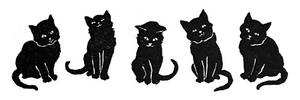
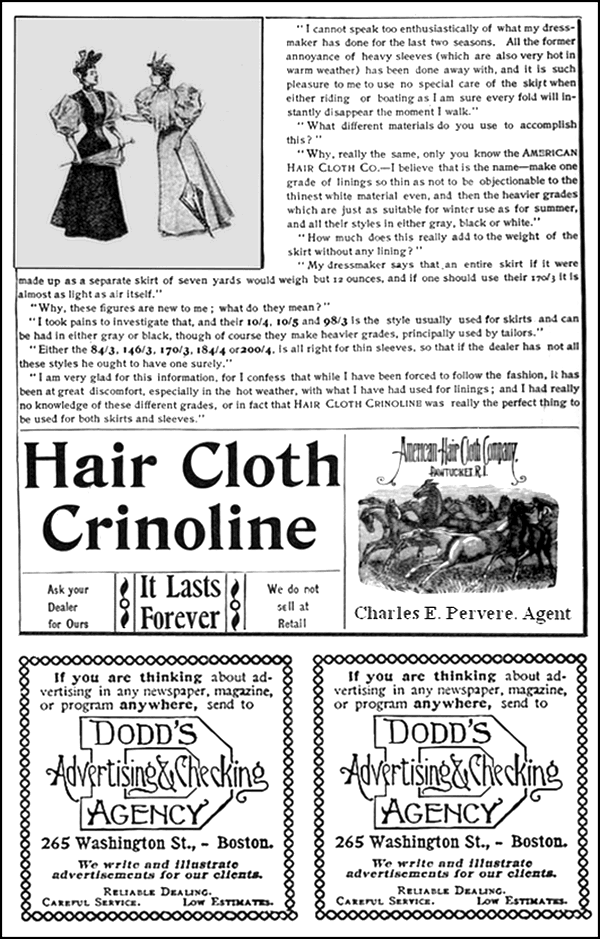
"I cannot speak too enthusiastically of what my dressmaker has done for the last two seasons. All the former annoyance of heavy sleeves (which are also very hot in warm weather) has been done away with, and it is such pleasure to me to use no special care of the skirt when either riding or boating as I am sure every fold will instantly disappear the moment I walk."
"What different materials do you use to accomplish this?"
"Why, really the same, only you know the American Hair Cloth Co.—I believe that is the name—make one grade of linings so thin as not to be objectionable to the thinest white material even, and then the heavier grades which are just as suitable for winter use as for summer, and all their styles in either gray, black or white."
"How much does this really add to the weight of the skirt without any lining?"
"My dressmaker says that an entire skirt if it were made up as a separate skirt of seven yards would weigh but 12 ounces, and if one should use their 170/3 it is almost as light as air itself."
"Why, these figures are new to me; what do they mean?"
"I took pains to investigate that, and their 10/4, 10/5 and 98/3 is the style usually used for skirts and can be had in either gray or black, though of course they make heavier grades, principally used by tailors."
"Either the 84/3, 146/3, 170/3, 184/4 or 200/4, is all right for thin sleeves, so that if the dealer has not all these styles he ought to have one surely."
"I am very glad for this information, for I confess that while I have been forced to follow the fashion. It has been at great discomfort, especially in the hot weather, with what I have had used for linings; and I had really no knowledge of these different grades, or in fact that Hair Cloth Crinoline was really the perfect thing to be used for both skirts and sleeves."
Hair Cloth
Crinoline
Ask your Dealer for Ours
It Lasts
Forever
We do not sell at Retail
[Pg 51]
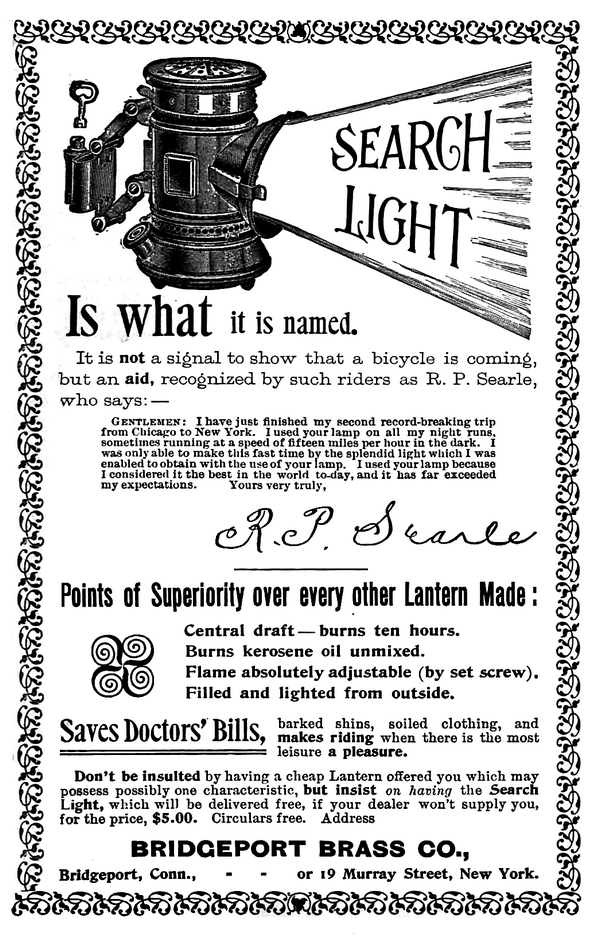
Points of Superiority over every other Lantern Made:
[Pg 52]
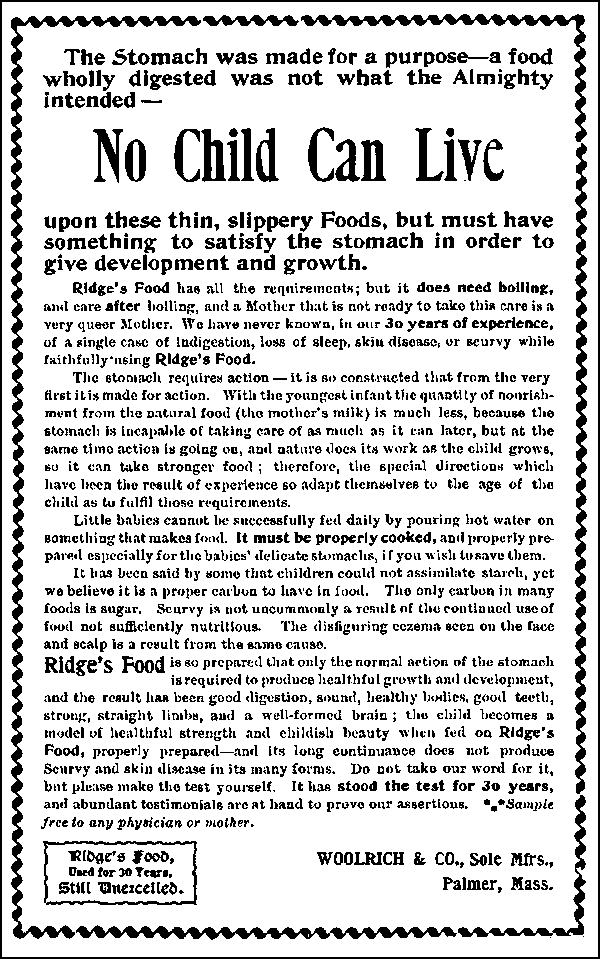
Ridge's Food has all the requirements; but it does need boiling, and care after boiling, and a Mother that is not ready to take this care is a very queer Mother. We have never known, in our 30 years of experience, of a single case of indigestion, loss of sleep, skin disease, or scurvy while faithfully using Ridge's Food.
The stomach requires action—it is so constructed that from the very first it is made for action. With the youngest infant the quantity of nourishment from the natural food (the mother's milk) is much less, because the stomach is incapable of taking care of as much as it can later, but at the same time action is going on, and nature does its work as the child grows, so it can take stronger food; therefore, the special directions which have been the result of experience so adapt themselves to the age of the child as to fulfill those requirements.
Little babies cannot be successfully fed daily by pouring hot water on something that makes food. It must be properly cooked, and properly prepared especially for the babies' delicate stomachs, if you wish to save them.
It has been said by some that children could not assimilate starch, yet we believe it is a proper carbon to have in food. The only carbon in many foods is sugar. Scurvy is not uncommonly a result of the continued use of food not sufficiently nutritious. The disfiguring eczema seen on the face and scalp is a result from the same cause.
Ridge's Food is so prepared that only the normal action of the stomach is required to produce healthful growth and development, and the result has been good digestion, sound, healthy bodies, good teeth, strong, straight limbs, and a well-formed brain; the child becomes a model of healthful strength and childish beauty when fed on Ridge's Food, properly prepared—and its long continuance does not produce Scurvy and skin disease in its many forms. Do not take our word for it, but please make the test yourself. It has stood the test for 30 years, and abundant testimonials are at hand to prove our assertions. Sample free to any physician or mother.
[Pg 53]
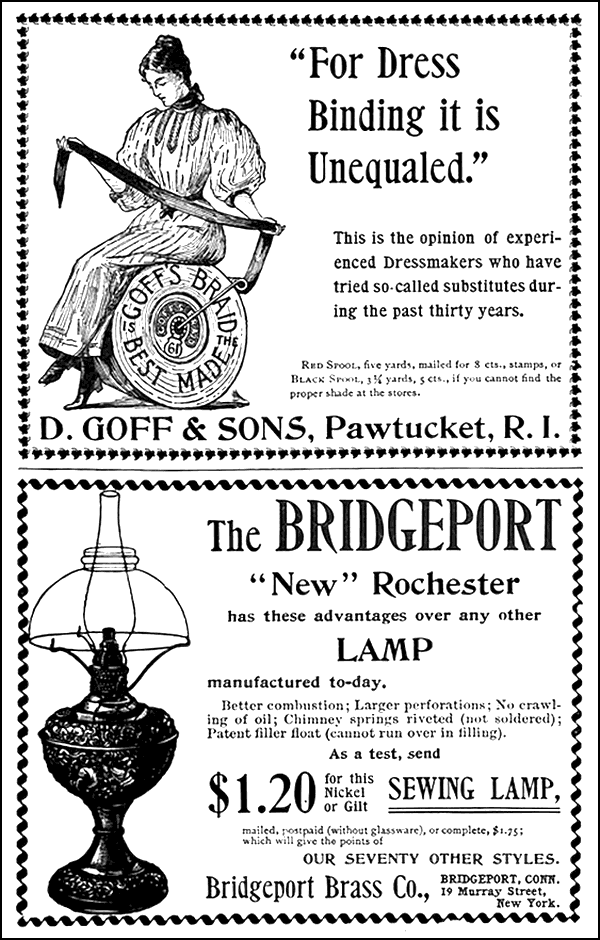
D. GOFF & SONS, Pawtucket, R.I.
[Pg 54]
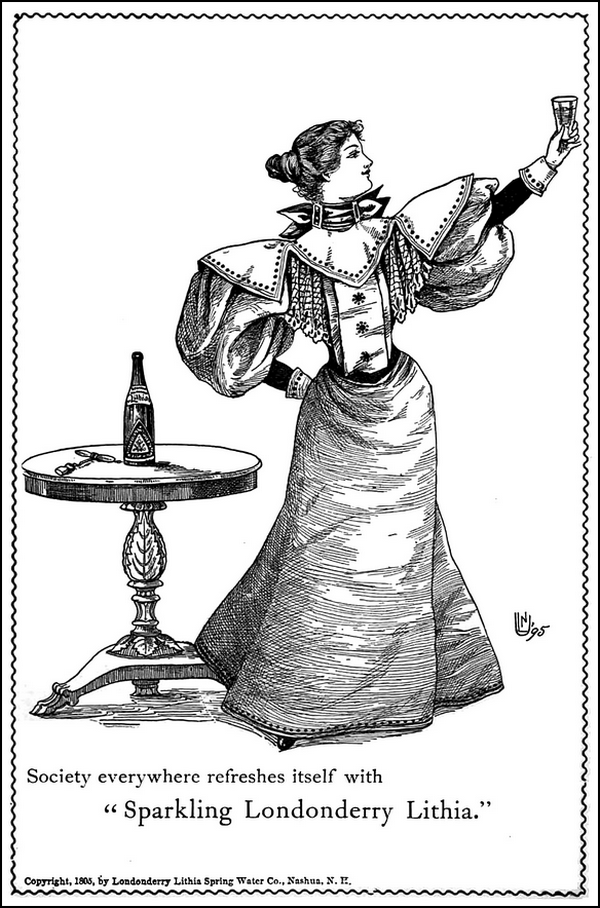
Society everywhere refreshes itself with
"Sparkling Londonderry Lithia."
Copyright, 1805, by Londonderry Lithia Spring Water Co., Nashua, N. H.
[Pg 55]
How many people realize the necessity of drinking large quantities of water in order to keep in absolutely good health? When it is remembered that nearly two thirds of the substance, by weight, of the human body is in the form of water, included in the composition of the various tissues, the importance of using water in liberal quantities internally becomes at once apparent. The most eminent physiologists have computed that, in order to supply the losses by excretions and evaporation taking place in the human body, it is necessary to drink from a half to one gallon of water daily. This, too, in addition to the water contained in the beverages, such as tea, coffee, etc., which are in common use. It is an uncontested and fundamental truth of hygiene that water supplied for drinking purposes must be of the very best quality and perfectly pure and free from the slightest trace of organic matter. The desire for water of this kind among intelligent people is seen in the large number of natural waters now offered for sale. It is known, too, that in the treatment of many common forms of disease natural mineral waters are one of the most important factors.
Of all of these waters, none are equal to the Londonderry Lithia
Water. The array of reliable medical testimony in its favor is
overwhelming and shows that all good livers should use this
water liberally from time to time. Londonderry stands decidedly
ahead of all the lithia waters, a fact that has been proven by
actual investigation and experience.
[Pg 56]
Publisher's Price, $7.50 for both, or $3.75 each.
Our Price, $2.00 for both, or $1.00 each.
Delivered to any part of the United States,
express or postage prepaid.
The Story of Our Post Office.
By Marshall Cushing, Private Secretary to Postmaster-General Wanamaker.
A complete story of our National Post Office Department, turned inside out; crammed full of information and the most romantic, laughable, tragic, and wonderful incidents on record. It includes descriptions of mail transportation in this country and across the water; of the manufacture of stamps and postal cards; of the methods and treasures of the Dead Letter Office. It gives pictures and sketches of the chief postmasters of the country, relates the government's encounters with frauds, lotteries, and green goods men, and describes the work of women in this department. The author is widely known as one of the raciest and ablest writers in America. The position he has occupied with the Postmaster-General of the United States for four years is the highest commendation of his work.
The Story of Government.
By Henry Austin.
This work treats of Evolution and Government, as traced from animals to savage tribes, upwards through the successive stages of barbarism and civilization. By means of a wealth of anecdote and allusion it introduces the reader into gypsy camps, Fenian and Nihilistic meetings, criminal colonies, modern republics, and picturesque courts of bygone centuries. It is a treasury of knowledge previously unpublished, taught in no text-book, and unknown in universities; written so plainly and picturesquely that a child will understand and a philosopher enjoy. Its field is the world, and its audience humanity. Indorsed by Edward Everett Hale, Vicar-General William Byrne, Gen. Douglas Frazar, Edward Bellamy, and many others represented in the world of letters. One of the foremost women of the day, Mary A. Livermore, says: "The section relating to modern women is admirable."
Either of the above superb books, handsomely bound, will be delivered to any part of the United States, express or postage prepaid, for $1.00.
Address Trade Company, 148 High Street, Boston, Mass.
[Pg 57]
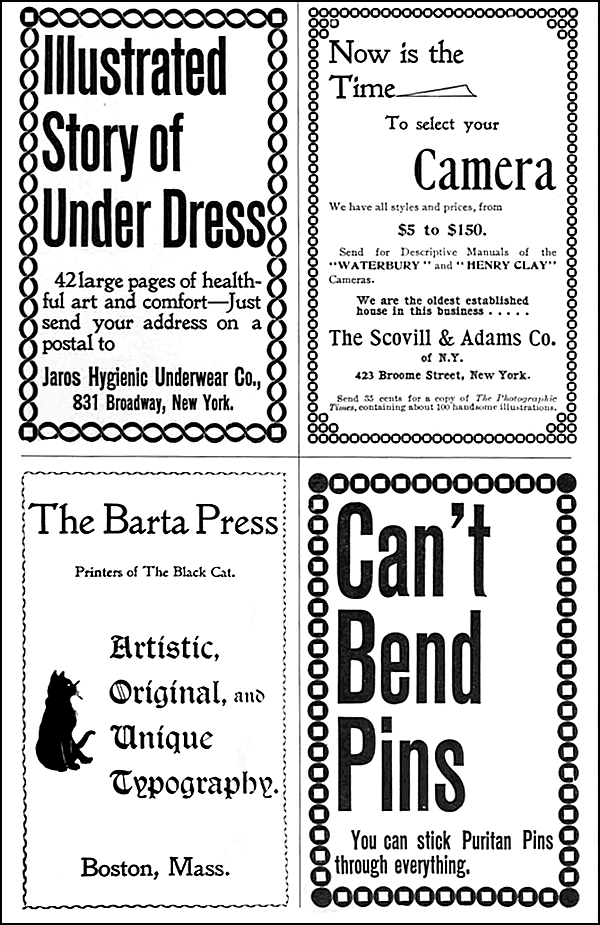
Jaros Hygienic Underwear Co.,
831 Broadway, New York.
Send 35 cents for a copy of The Photographic
Times, containing about 100 handsome illustrations.
Boston, Mass.
[Pg 58]
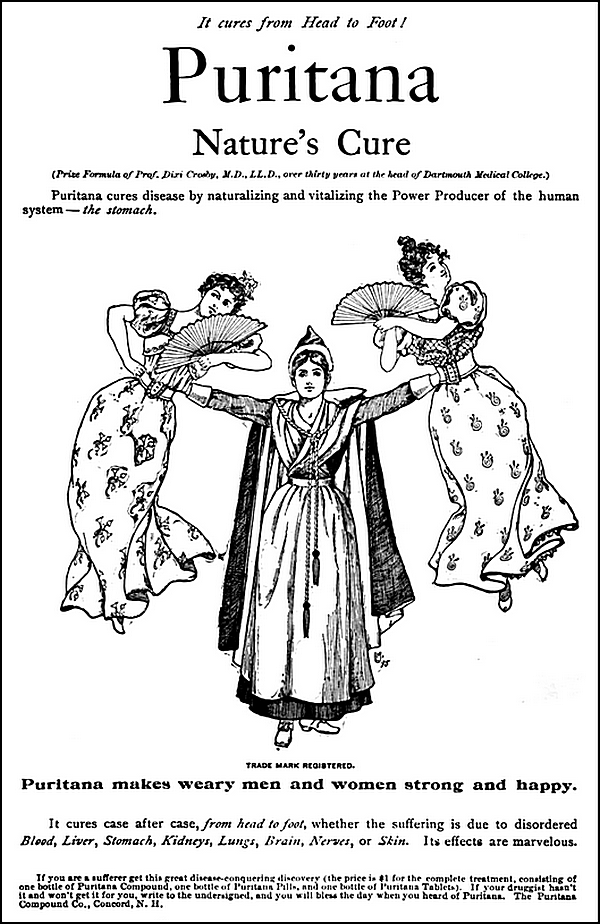
[Pg 59]
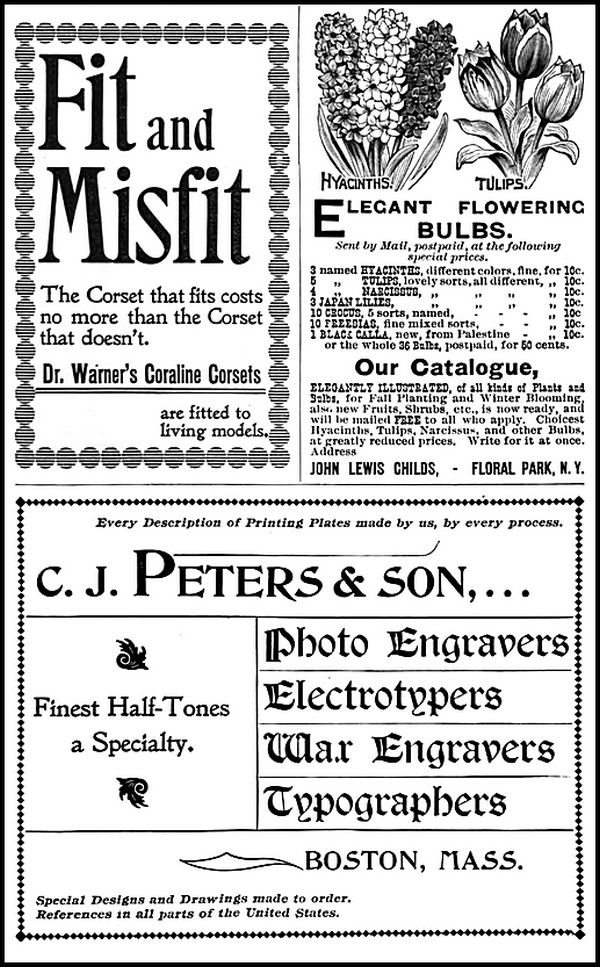
| 3 named | HYACINTHS, different colors, fine, for | 10c. |
| 5 " | TULIPS, lovely sorts, all different, " | 10c. |
| 4 " | NARCISSUS, " " " " | 10c. |
| 3 " | JAPAN LILIES, " " " " | 10c. |
| 10 " | CROCUS, 5 sorts, named, - - - " | 10c. |
| 10 " | FREESIAS, fine mixed sorts, - - " | 10c. |
| 1 " | BLACK CALLA, new, from Palestine - " | 10c. |
[Pg 60]
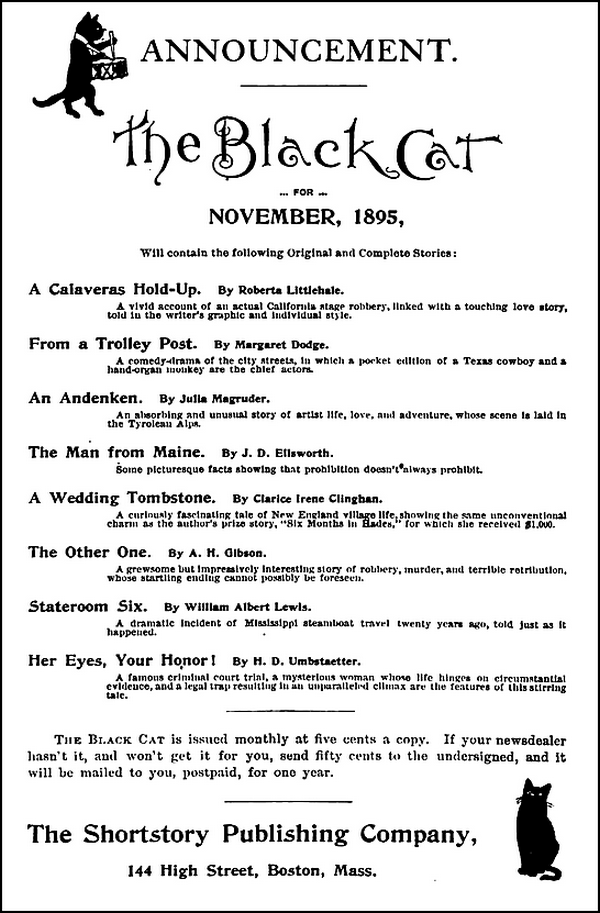
[Pg 61]
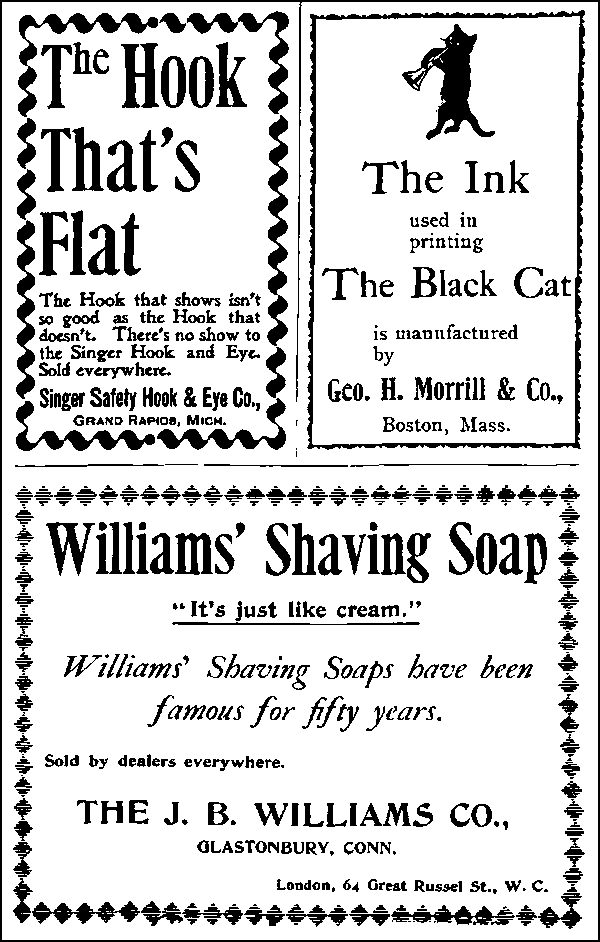
The Hook that shows isn't
so good as the Hook that
doesn't. There's no show to
the Singer Hook and Eye.
Sold everywhere.
[Pg 62]
The publishers take pleasure in announcing an unusual amount of good fiction. Early issues of the Atlantic will contain The Apparition of Gran'ther Hill, by Rowland E. Robinson; Pilgrim Station, by Mary Hallock Foote; Athenaise, a Creole Story, by Kate Chopin; The End of the Terror, by Robert Wilson, a Southern writer. Aside from these, there will be stories by Mrs. Wiggin, Henry James, L. Dougall, Ellen Mackubin, and others.
Conspicuous in the Fall issues will be papers of Travel. Lafcadio Hearn will contribute sketches and interpretations of the new Japan. There will be further papers in Mr. Peabody's An Architect's Vacation series, the forthcoming one being entitled The Venetian Day. A delightful paper of Spanish travel by Mrs. Miriam Coles Harris can be promised, and Alice Brown will write of a visit to the original Cranford. Bradford Torrey will publish further sketches of life and nature in his Tennessee haunts. Other articles of special interest, which can perhaps be classed under this head, will be Reminiscences of Eastern Travel by Miss Harriet Waters Preston; and Josiah Flynt, who has become an authority on the vagrant, will contribute one of his entertaining studies of tramp life, The Children of the Road.
The subject of Education will, as usual, receive attention. The Atlantic was the first of the leading magazines to make the discussion of important educational questions one of the features of its pages. In early issues will be printed articles by President Tucker, of Dartmouth, and Professor J. H. Wright, of Harvard.
The usual departments and the exhaustive book-reviews will continue to be features of each issue.
35 cents a copy. $4.00 a year.
Houghton, Mifflin & Company,
4 Park St., Boston. 11 East 17th St., New York.
[Pg 63]
The Story of Christine Rochefort.
By Helen Choate Prince. Third Edition. $1.25.
"Mrs. Prince, granddaughter of Rufus Choate, has written a novel particularly strong in its well-knit style.... The personal touches, scenes, and conversations are delightful."—Chicago Times-Herald.
"The story throughout exhibits a sweetness and elevation of tone which is in charming contrast to the generality of novels."—Literary World.
"I like everything about it."—Horace Howard Furness, LL. D.
Daughters of the Revolution.
By Charles Carleton Coffin, author of "The Drum-Beat of the Nation," etc. With illustrations. Second Edition. Crown, 8vo, $1.50.
"Mr. Coffin's story is one of thrilling interest, and is at the same time an historically accurate presentation of the scenes, events, and the spirit of the people of the colonies at the fateful outbreak of the Revolution."—Boston Advertiser.
A Soulless Singer.
By Mary Catherine Lee, author of "A Quaker Girl of Nantucket," and "In the Cheering-Up Business." 16mo, $1.25.
"The story's motive is the power of human passion to give to a voice which is otherwise noble and well trained the quality of feeling, of soul, which is essential to the really great singer.... The story is well written."—Springfield Republican.
"A daintier, prettier love-story than this it would be hard to find."—Chicago Interior.
Under the Man-fig.
By M. E. M. Davis. 16mo, $1.25.
"A story of the old South by a writer who knows well how to use the rich material afforded by that picturesque time and people."—Nashville Banner.
"An exciting story and a strong study of character."—Portland Transcript.
Stories of the Foot-hills.
By Margaret C. Graham. 16mo, $1.25.
"The glimpses of manners and social usages of the Western foot-hills are, in our opinion, more irresistible than the weather-worn peculiarities of New England that have been dragged through so much of the storm and sun of modern fiction."—New York Times.
Philip and His Wife.
By Mrs. Deland, author of "John Ward, Preacher," "The Old Garden," etc. _Eighth Thousand._ 16mo, $1.25.
"An interesting and absorbing romance, one of those rare creations in our slip-shod era of a story as well written as it is interesting."—_London Telegraph._
"A book of genuine originality and power."—_New York Tribune._
The Story of Lawrence Garthe.
By Mrs. Kirk, author of "The Story of Margaret Kent," etc. 16mo, $1.25.
"I have had a delightful feast, charming and absorbing from beginning to end.... It is all fascinating, and the plot is managed so admirably throughout."—Horace Howard Furness, LL. D.
Sweet Clover.
By Clara Louise Burnham, author of "Dr. Latimer," "Miss Bagg's Secretary," etc. _Ninth Thousand._ 16mo, $1.25.
"Mrs. Burnham has laid the scene of her pleasant, pure-toned romance among the glories of the White City. It is delightful to have them reanimated in such a vivid manner."—_Literary World._
Cœur d'Alene.
By Mary Hallock Foote, author of "John Bodewin's Testimony," "The Led Horse Claim," "In Exile," etc. 16mo, $1.25.
"The movement of the story is rapid, the interest most intense, and the event almost tragic; but the narrative is interspersed with many a scene sparkling with humor and brilliant dialogue."—_Books, Denver._
_Sold by all booksellers. Sent postpaid, by_
HOUGHTON, MIFFLIN & CO., Boston.
11 East 17th Street, New York.
[Pg 64]
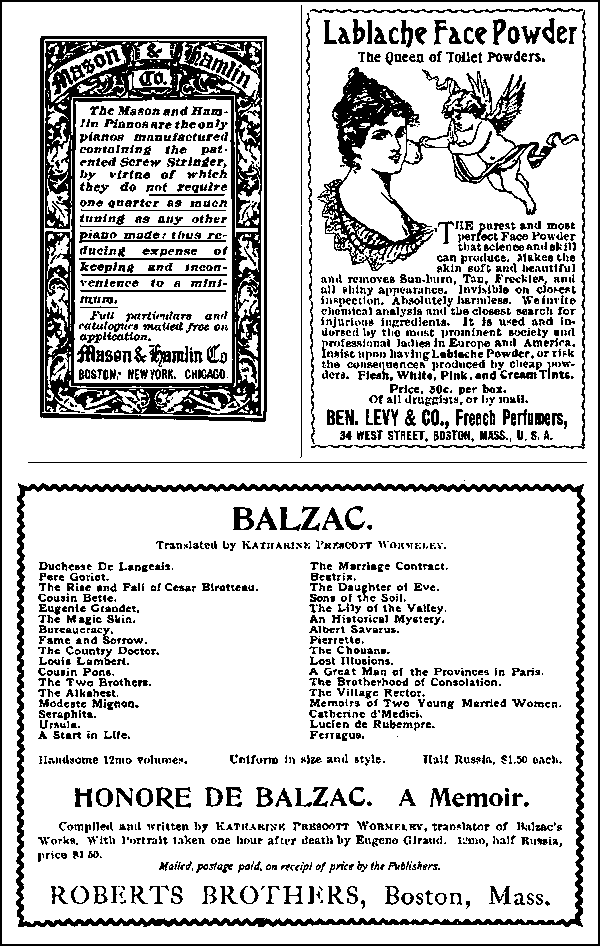
Handsome 12mo volumes.Uniform in size and style.Half Russia, $1.50 each.
HONORE DE BALZAC. A Memoir.
Compiled and written by Katharine Prescott Wormeley, translator of Balzac's
Works. With Portrait taken one hour after death by Eugene Giraud. 12mo, half Russia,
price $1.50.
_Mailed, postage paid, on receipt of price by the Publishers._
ROBERTS BROTHERS, Boston, Mass.
[Pg 65]
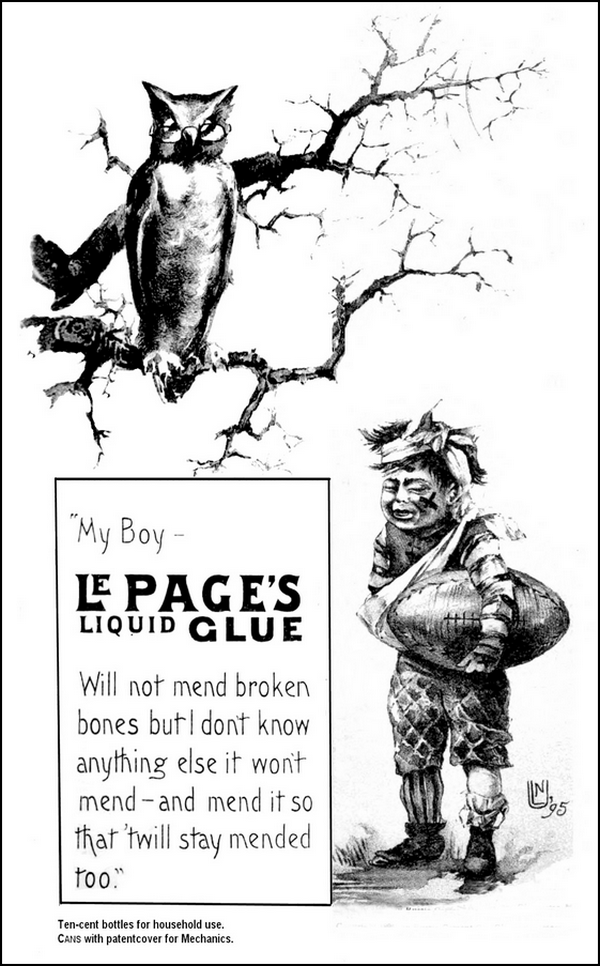
[Pg 66]
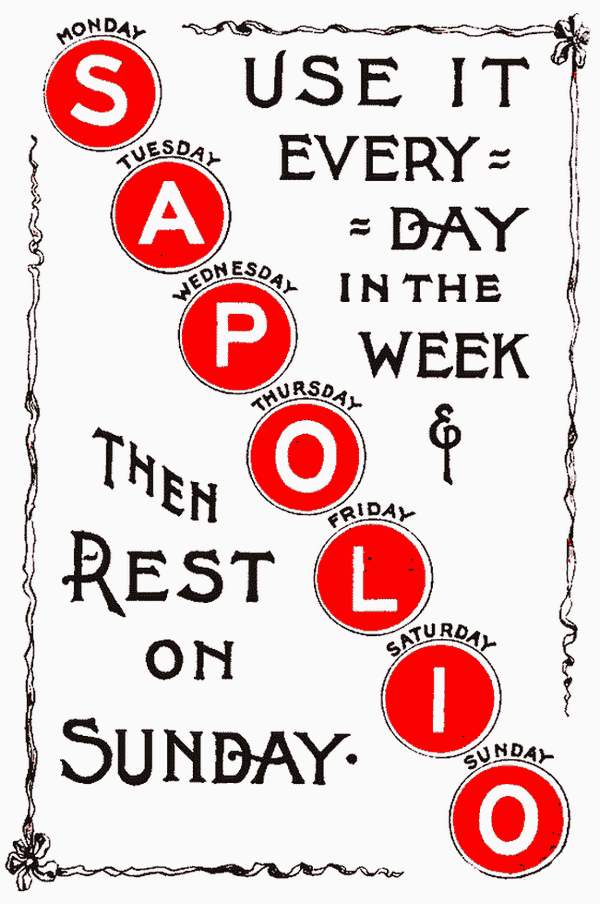
Transcriber's Notes.
1. Table of Contents created by the transcriber.
2. Retained anachronistic, non-standard spellings and typographical errors as printed.
3. Lines 259 and 1161. Double quotes added.
This eBook is for the use of anyone anywhere in the United States and most other parts of the world at no cost and with almost no restrictions whatsoever. You may copy it, give it away or re-use it under the terms of the Project Gutenberg License included with this eBook or online at www.gutenberg.org. If you are not located in the United States, you will have to check the laws of the country where you are located before using this eBook.